










The Ontarion is your independent campus newspaper at the University of Guelph. Since 1951, we have published news, opinion, photos, satire, art, reviews, and much more as we pursue our telling the stories that live in our community.


You don’t know who wrote it or why


AI-generated junk is everywhere
No rules about fixing errors
Fake news spreads easily
Your feed is shaped by algorithms
Has amazing memes



But we are so much more than that! We are more than a newspaper; we’re your hub for getting real experience, meeting new people, and contributing to your community. Whether you're a reader, writer, photographer, or just curious, there’s a place for you at The Ontarion. Join us and be part of something real.
Our content is written by real, named contributors


We only publish work by real writers, photographers, and artists
If we make a mistake, we correct it publicly and clearly
We carefully fact-check everything we publish
We don’t chase clicks — we care about the truth
Well, 5 out of 6 ain’t bad!


To learn more about The Ontarion, check out: ontarion.com/about



4 & 5. Welcome letters
101
6. Getting to know the Central Student Association 101
Words of advice from the Multi-Faith Resource Team
7. Your first workout starts here: fitness 101
9. Campus card 101: the perks of being a U of G student
Parking 101: campus edition
11. Commuting 101: your survival guide
12. Sexuality 101: let's talk about it
13. Indigenous student services 101: your guide
15. Campus food guide 101
16. More than just grades: connecting with professors 101
17. Library services 101
18. Mental health tips for students
19. Living in Canada 101: the international students' guide to navigating campus resources
20. Coping with illness away from home
21. Making friends on campus
Creating the ultimate student budget
23. The ultimate roommate guide
Scams: how to recognize and avoid them
24. A first-year’s guide to navigating university
25. Laundry 101: it can be just that simple
26. High school to undergrad: advice from a recent graduate
27. The best places to shop in Guelph
28 & 29. Campus map
31. An introvert’s guide to orientation
32. Healthy mind, healthy body: campus services you should know about
33. Tips for science students
38. A glimpse into the history of The Bullring COMMUNITY 101
34. Everything you need to learn about the campus co-op
35. Getting to know the wildlife on campus
37. Struggling to afford food? You’re not alone
39. A guide to painting The Cannon
41. U of G’s historical structures
42. How to speak ‘Guelph’
43. Exploring campus lecture halls
44. 101 things to do before you graduate
45. Where's your best study spot?
47. Purse essentials
Cut-out laundry guide
49. How should you spend a weekend in Guelph?
50. Because we asked...
51. September to-do list
52. Pets of the month
53. We are The Ontarion Why volunteer?
54. Puzzles page
DURING HAPPY HOUR & LATE NIGHT 3-6 & 9-CLOSE
THERE’S ALWAYS A REASON TO COME IN





4 BELLINIS & 2 STARTERS FOR $40 MONDAY MEET UP 50% OFF ALL BOTTLES OF WINE TUESDAY WINE DOWN
A STARTER, 2 MAINS, A DESSERT FOR $75 PAIR WITH TWO GLASSES OF PROSECCO FOR $25 WEDNESDAY DATE NIGHT
THURSDAY MARTINI SUNDAY ALL YOUR FAVOURITE CAESARS AT $7 CAESAR
ENJOY OUR MARTINIS FOR $10 OR A BELLINI FOR $6

Welcome to the University of Guelph.
To all new and returning students: welcome. I’m glad you’re here.
There’s something special about the start of a new academic year. Whether you’re stepping onto campus for the first time or returning to familiar places and people, this moment brings a sense of possibility and excitement. I hope you feel ready to learn, connect and make the most of your time at U of G.
At the University of Guelph, your education goes far beyond lectures and labs. You’ll learn from professors who are passionate about teaching and genuinely care about your success. You’ll also have opportunities to apply your learning in meaningful ways—through co-op placements, undergraduate research, student clubs, athletics, leadership or volunteer roles. There’s no single path through university. Part of the experience is discovering what matters to you and how you want to learn and grow.
We also know university life can feel overwhelming sometimes. Please know that there is support in place to help you navigate challenges, find balance and feel connected. Whether you’re looking for academic advising, mental health services, wellness programming, financial help or career planning, there are people here ready to help. Many of these services are offered by our teams in Student Experience, Student Wellness and Student Financial Services.
If you’re new to U of G, I encourage you to check out Star tUofG. It’s a great place to find key dates, Orientation events, and tips for getting involved in your first year. It also helps you get to know the many ways to connect with your peers and the broader campus community.
And your university experience will be shaped by more than just what happens on campus. The City of Guelph plays a big part in your student life. It’s a welcoming, vibrant place with parks and trails, live music, local food and a strong sense of community. Whether through part-time work, volunteer ing,or just finding your favourite coffee spot (with WiFi), we hope you find ways to make it feel like home.
Thank you for choosing the University of Guelph and for being here as part of our campus community. I look forward to seeing you on campus and wish you the very best for the year ahead.
Rene Van Acker President and Vice-Chancellor
president@uoguelph.ca
Vice Chancellor

Welcome to the 2025–2026 Academic Year, Gryphons!
Whether you're arriving on campus for the first time or returning for another exciting year, we’re so glad to have you as part of our U of G community.
As Vice-Provost (Student Affairs), I want you to know that from Orientation to Graduation, we’re here to support you— both inside and outside the classroom. Our team is dedicated to helping you thrive with resources, spaces and opportunities designed to help you learn, grow, connect and feel at home.
Looking to meet new people or get involved? Visit GryphLife. ca—your go-to spot for student clubs, campus events and leadership opportunities. Whether you want to join an intramural team, attend a wellness workshop, cheer on our varsity Gryphons or explore student government and advocacy, there’s something for everyone.
We hope your university experience is everything you’ve dreamed of—and more. But if things ever feel overwhelming, please remember that you’re not alone. Whether you need academic support, personal guidance or just someone to talk to, help is always nearby. Reach out to your Academic Advisor, explore the Library’s Learning Commons or connect with Student Wellness for medical care, counselling or accessibility services. You can learn more about all the ways we support students at uoguelph.ca/studentaffairs.

On behalf of the City of Guelph, I’d like to welcome you to our vibrant city, whether you’re returning for another exciting semester or beginning your journey as a first-year student.
Guelph is more than just the home of a renowned university; it’s a dynamic community filled with opportunities to learn, grow and connect. Our city boasts beautiful green spaces like the Arboretum, perfect for peaceful walks and outdoor study sessions. Downtown Guelph’s historic charm offers a lively mix of night clubs, cafes, local shops, and cultural venues, making it an ideal spot to unwind with friends.
For those who love the outdoors, the Speed River trails and Riverside Park offer scenic routes for biking, jogging, or simply enjoying nature. Our thriving arts scene, bustling farmers’ markets and diverse culinary landscape reflect Guelph’s creative and inclusive spirit.
As you embark on this academic year, I encourage you to explore all that Guelph has to offer. Engage with the community, participate in local events and make lasting connections. We’re proud to have you here and excited to see the contributions you’ll make to our city.
Wishing you a successful and inspiring year ahead. Go Gry-




On behalf of The Ontarion, I’d like to welcome you back to campus for the 2025-2026 school year!
The paper you’re reading is Guelph 101, our back-to-school issue, where we cover the important things you need to know as a firstyear or returning student. You can find tips about adjusting to university life, academics, living with roommates, updates on campus parking and so much more. This paper is a guide to get you settled back into the academic routine for the fall semester. We hope it’s helpful!
student newspaper since 1951.
We are a non-profit organization, meaning that all the money we make is invested back into our mission. We’re always looking for new ways to engage the student community, inspire student voices and represent the greater population of undergraduate and graduate students.
From the very beginning, more than 70 years ago, we’ve covered stories that matter to students.
We talk about anything from campus controversy to local news to fun activities to do in your free time. We’re always on the hunt for the next best story to share with our readers.
We also offer amazing opportunities for volunteers to write stories, take photos and attend our
weekly meetings to learn more about journalism. This year, we have some big plans ahead that we’re excited to share.
We’ll be hosting weekly seminars for our volunteers to improve their writing and journalism skills. Each seminar this semester will cover a new topic, from learning how to structure an effective interview to covering a campus sports event. If this sounds interesting to you, connect with us on social media to learn more.
We’re also launching our Opinion Workshop, where writers are welcome to learn the art of persuasive writing. We’ll be hosting in-office workshops that include one-on-one sessions with editors where you can receive instant
feedback on your work. One of our goals this year is to publish more opinion writing that reflects the thoughts and perspectives of students. If you have a strong opinion you’d like to share with the campus community, please reach out.
Lastly, we’re proud to announce the re-opening of our website. You can read everything in the print edition, find expanded versions of stories and stay up to date with the events and latest news on campus.
The Ontarion website is actually one of the oldest Canadian newspaper websites (even older than the Toronto Star), and we’re thrilled to have it up and running for the best school year yet.
If you’d like to learn more about what we do here, please reach out. You can find us on the second floor of the University Centre (UC 264) or you can drop me an email at editor@theontarion. com.
We publish in print once a month during the academic year and one summer issue, so keep your eyes peeled at all of our different locations (with over 70 locations in Guelph) where you can grab a paper.
Here’s to an awesome year ahead!
Sincerely,
Rachel Fioret Editor-in-Chief
The Central Student Association (CSA) is the representative body of undergraduate students. It is led by a team of elected undergraduate students and works with the university to ensure students’ needs are met.
They also work with the Graduate Students Association on some business items that pertain to both the undergraduate and graduate student populations.
The CSA offers many ser-
vices, with these being some of the more pertinent ones:
1. Student Help and Advocacy Centre
2. Bike Centre
3. Guelph Student Foodbank
4. The Cannon
5. Safewalk
The Student Help and Advocacy Centre (SHAC) is here to help with questions on housing and renting in Ontario, as well as offering legal aid, including

off-campus resources. They can be contacted by email or through their office on the second floor of the University Centre building during office hours.
The Bike Centre offers free repairs and assistance for students. They are located at 620 Gordon St. near the Indigenous Student Centre. They host an annual bike auction where students can purchase a second-hand, repaired bike. There are set days to
Whether you’re looking for a community to expand and continue your faith, or you want to explore others, the Multi-Faith Resource Team (MFRT) has you covered.
Part of Student Experience, the MFRT aims to spiritually support students and to celebrate the diversity of faith in the campus community.
Sonya Wu-Winter, multifaith programs coordinator, recommends paying attention to the religious accommodations offered within the first two weeks of each semester, as one of many resources provided by the MFRT.
Wu-Winter explained that the MFRT encourages students to “bring their whole self to campus, including their religious practices.”
“There’s room here to grow in that part of life, we don’t expect
you to leave it outside of university, and we provide places to nurture that.”
She added that the religious accommodations serve “people whose religious commitments may conflict with an exam can request accommodation early in the term.”
Additionally, Multi-Faith Prayer spaces are one of the most important resources for faith communities on campus that Wu-Winter says to take advantage of.
“There are seven labelled quiet spaces on campus that hope to provide a space to step out of the business of campus and take a moment to yourself. Students can take a quiet time out of their day for prayer, meditation and reflection.”
Students are also encouraged to look into a new service, called the Bridging the Gap workshop.
Students who enroll in the sixweek course will receive a cer-
tificate of completion, alongside building communication skills.
Wu-Winter's final piece of advice is to attend the Multi-Faith Resource Fair on Sept. 4 in front of Raithby House.
“There will be freezies, religious games and students can get to know the 16 faith groups on campus at their tabling event.”
"It's a good chance for new students who are looking at faith and spirituality resources to meet the spiritual groups on campus and get to ask questions and hear about upcoming events,” she emphasized.
“Community is important for fostering faith, and we encourage students to visit spiritual groups on campus.”
To learn more about what the Multi-Faith Resource Team offers, visit: uoguelph.ca/studentexperience/mfrt/.
see the bikes in person, with the auction held on their Instagram.
The Guelph Student Foodbank offers food for students in need and is located at 620 Gordon St. To find their operating hours or to donate, you can go to csaonline.ca/services/guelph-student-foodbank/.
The Cannon is an online repository. It posts second-hand books and other items needed for your courses. It also has hous-
ing listings designed for students, where you can find rentals. Visit here: thecannon.ca.
Safewalk is a service to help students arrive home safe at night. They are reachable through the SafeGryphon app or by using one of the many yellow emergency poles on campus. You can call (519) 824 4120 x53200.
To learn more about the many other services offered by the CSA, you can visit: csaonline.ca.
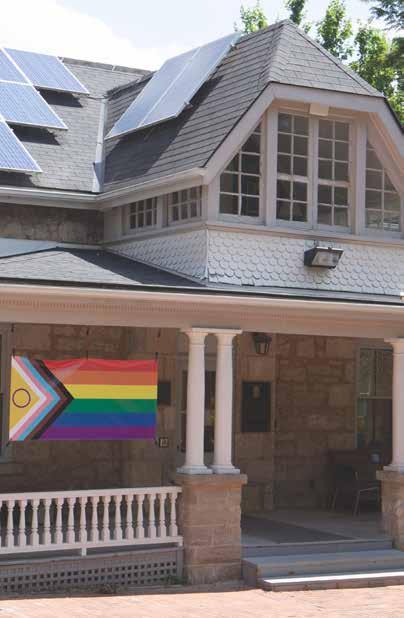

Your ultimate guide to
If you think the Athletic Centre is just a place for gym buffs and varsity athletes, think again. The Athletic Centre offers more than just a workout; it’s a place to decompress, have fun and recharge your mind as much as your body. From drop-in rec to quiet yoga sessions, it’s all included in your student experience.
The Ontarion toured the Athletics Centre with Jennifer O’Neill, manager of recreation, fitness and client services, to break down everything the Athletics Centre has to offer. One of the first things that students usually gravitate towards is the drop-in recreation and intramurals. But what is the difference between the two?
Drop-in recreation is your low-commitment, zero-pressure option. Want to play basketball at lunch? Swim a few laps after your morning lab? Just show up. There’s no registration and no guilt if you skip a day (or week). If basketball or swimming isn’t your thing, no worries! There are plenty of options to choose from that may be of interest. You can find the full list of drop-ins and their designated schedules on the Athletics Centre website: fitandrec. gryphons.ca/sports-clubs/drop-inrec.
On the flip side, intramurals are for those who like a bit more structure and friendly competition. You can sign up with a team or register as a free agent to get
matched. Once you're in, you’ll receive a game schedule and have a referee to keep things fair. Unlike drop-in, intramurals require a bond deposit, similar to a damage deposit for renting a house. If your team shows up and plays fair (i.e. no fights!), you’ll get it back. Both options (drop-in rec and intramurals) are included in your baseline athletic fees, meaning you’re already paying for them through tuition. So if you’ve been waiting for a sign to try something new, this is it.
Additionally, with your student fees, you get access to a wide range of spaces and activities.
The arena, fieldhouse, beach volleyball courts and even the Rec Room are all open for students. The Rec Room, located in the historical wing, offers table tennis, heavy bags and space for dancing or yoga.
A new addition this year is the beach volleyball intramural tournament kicking off this September. It’s a great excuse to pretend you’re on a sunny vacation while you’re actually just steps away from your afternoon class. Another addition to the Athletics Centre this year is that students can bring a friend–someone visiting from home or another university–and sign them in with a discounted day pass rate.
O’Neill shared that they want to remove barriers for students who might feel hesitant going
alone. "Sometimes you just need somebody with you," she said.
"Students who bike here and get all sweaty, guess what? With your student fee, you can just swipe in and use the shower," O’Neill said.
You can either rent a locker for the entire term or bring your own lock to use a locker for the day. This is a game changer for commuter students or anyone stuck lugging around a heavy backpack all day. If this is of interest to you, locker rentals are arranged in person at Client Services, located right in the Athletic Centre.
Now, if you want more than drop-in sports and basic gym access, consider the NRG Membership. For $55 per semester, plus tax students can access the fitness centre, unlimited fitness classes and Gryphon Fitness OnDemand virtual classes.
Looking to climb a new challenge? The NRG Plus Membership, at $99 plus tax, is essentially the regular NRG membership but also includes access to the rock climbing wall for the entire semester. O’Neill also shared that there are punch passes and day passes available for the climbing wall. So if you’re not ready to commit for a whole term, you can still give it a try.
Still feeling nervous about hitting the gym? The Athletic Centre offers women-only hours
for basketball, lane swims and fitness classes. There are also LGBTQ+ times in both the Energy Zone and the pool. The Energy Zone–which is a separate area of the fitness centre–even features sensory-friendly hours with lower lighting and no music, designed to create a calm and welcoming space for students with sensory processing needs or those who just want a quieter workout environment. These inclusive initiatives came from listening to student feedback. O’Neill shared that they received feedback that these spaces help students feel more comfortable and empowered to move their bodies.
For students who are new to the gym, the Learn to Lift program is an excellent place to start. These small-group sessions teach you how to use equipment safely and confidently. While this program isn’t included in your membership, O’Neill says it’s worth it for the added support and structure. Alternatively, fitness classes such as pilates, cycling, yoga and more are included with the NRG membership. While pre-registration isn’t always required, it’s highly recommended for popular classes since they fill up fast. Just remember to bring your student card for check-in.
Besides workout spaces, the Athletics Centre has a social lounge area with a Booster Juice and even a microwave for students
who bring their own meals. It’s not a quiet study area, but a place to relax, refuel and meet new friends between classes. If you’re still feeling overwhelmed–which to be fair, you just read so much information–there are orientation sessions and tours available for new students. Client Services is also always ready to help answer questions or guide you through registration and membership options.
“I really want this space [to be for] when you're feeling a little anxious or maybe not, but that you come here and you're choosing movement and you're choosing community,” O’Neill shared.
“Building community is so underrated as an undergrad, I think it's really important to build community on campus. I hope for students who you know might not have gotten into residence, that through some of our programming, they can find that community here.”
Whether you're looking to strength-train, dance, swim, compete or just find a place to belong, the University of Guelph’s Athletic Centre is here to support you.
So grab your running shoes, bring a friend if you like and take advantage of everything already included in your student fees. Your mind and body will thank you and you might just find a new passion along the way.
















Everything you need to know about your campus card and why it’s so handy
SANA GURUNATHAN
Your campus card, also known as your student ID, is your primary University of Guelph identification. This card comes with many perks from the moment you register for it, so be sure to learn about all the ways you can use it during your studies.
Let’s start at the beginning. When you register for your campus card, you will be asked to submit a clear photo. This goes on the front of the card, along with your name and student ID number.
From the day you receive your campus card to the day you graduate, this card will be your
friend in navigating around campus and the city.
One of the first ways you use your student card might be at a campus dining hall. Upon acceptance to the university, students have access to a meal plan while living in residence. There are two different accounts included in your meal plan: Basic and Flex dollars. Basic is used for all food purchases in Hospitality locations, including the University Centre and Creelman Hall. Flex is used for vending machines, Brass Taps, The Bullring, dining at off-campus restaurants, delivery orders and Red Top Taxi Ser-
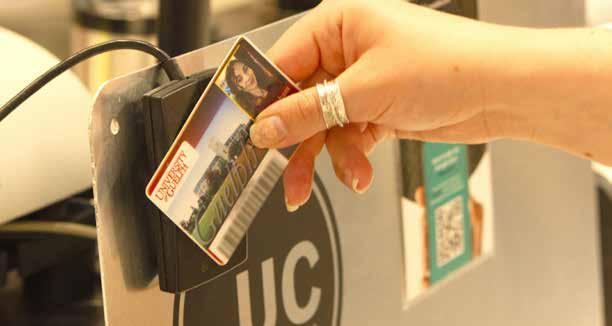
vice.
If at any point you are out of meal plan dollars, you are always able to either email the Campus Card Office or visit them in the basement level of the University Center and purchase additional basic or flex dollars for the rest of the school year.
Another way you might use your card early in the year is by exploring Guelph off-campus by taking the bus. A huge perk included with your campus card is access to Guelph Transit. Every year, the Central Student Association and the Graduate Student Association negotiate a bus pass
Everything you need to know to avoid getting a parking ticket this semester
RACHEL FIORET
Whether you’re a first-year student or a returning community member, this guide to parking on campus will help you navigate the updated parking lot zones, parking pass fees and other relevant information to prevent finding a ticket on your windshield after a day on campus.
Parking pass breakdown
The parking lots on campus are divided into zones: black, blue, red, yellow and green. Each zone is labeled in accordance to the proximity to the centre ofcampus, and therefore the cost of parking passes are determined by the zoning.
Updates
Parking Services have updated the community with new changes as of May 1, 2025.
• Graduate students may purchase black, red or yellow zone permits.
• Commuting students may
purchase red or yellow zone permits.
• Students in residence may purchase yellow zone parking permits. Residence students are required to park in a designated lot near their residence building.
• Permits are available on a first-come, first-served basis, with purchases depending on availability. Waitlists may become available when all permit zones are full.
• A new parking zone has been established, which is the Blue Zone. This zone was created by re-allocating portions of the former Red Zone parking lots. Additional red zone spaces have been re-allocated from under utilized PayByPhone areas.
• There are three discounted permits: P59, P18 and Gordon Hall. These permits are offered at a reduced monthly rate, and parking is allowed
only in the designated lot corresponding to the permit.
• EV Daily Permits are available for faculty, staff and students.
EV and Red Zone permits allow you to park at any red zone EV charger or red zone. Some red zone locations are limited to four hours max per day. EV and Yellow zone permits allow you to park at any yellow zone EV charger or yellow zone. You must park in an appropriate red or yellow zone when charging is complete or not required.
Parking Services has also shared that they will continue to improve and maintain parking lots and make repairs to the spaces as required.
Here are some important tips for parking on campus:
• Parking is complimentary on weekdays after 5 p.m. and all day on weekends.
that offers students unlimited access to Guelph Transit.
The goal is to provide new students with easier transportation, whether they're unfamiliar with Guelph and want to explore, or simply need to run errands like grocery shopping. Upon enrolment, students can tap their card on the HID reader when entering the bus.
You will also use your student card during exam season, as you need to bring it into each exam as a point of identification and to show your student number.
If at any point during your
studies you lose your campus card, it is recommended to immediately report it missing at one of the on-campus dining halls or the Campus Card Office. You can also get a replacement card simply by visiting the Campus Card Office and applying for a new one–there is, however, a small fee to get a new student card.
Overall, your campus card indicates your affiliation with the University of Guelph, providing you with easy access to perks such as Guelph Transit and a variety of meals.
Just don’t forget to have it on hand wherever you go!

• Parking spaces are first-come, first-served, even for those with a valid parking pass. If your preferred lot is full, you must park in the next available zone that corresponds to your permit’s designated colour.
• You can add up to three cars per parking pass, with only one car on campus at the same time.
• You can purchase a parking pass daily, monthly, semesterly or annually.
• Overnight Parking Restrictions are in effect Dec. 1 to March 31 whether there is snow on the ground. All vehicles must park in P13, P17, P18, P19 or Gordon Hall. You can also purchase dai-
ly parking passes if you park on campus occasionally. You can park on campus by using the PayByPhone or HONK apps in designated areas, or you can park in green, yellow or red zones by purchasing a daily permit via the online parking portal.
"Parking at the University is planned and managed strategically to ensure students, faculty and staff are able to use campus to its fullest. The University’s approach aims to balance current demands with future growth as we work towards our environmental stewardship goals and encourage an active and healthy campus," shared Shannon Talbot, manager of campus parking services.
To learn more about parking, visit: parking.uoguelph.ca/
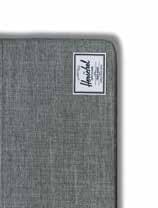






































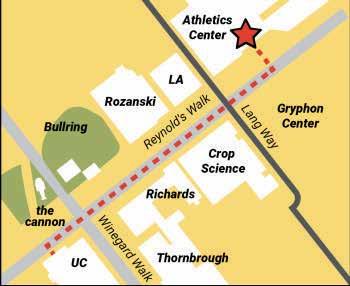




SARAH D’AVILA ALEMAN
If you’re a commuter this year, welcome to the club! The days will consist of long mornings, strategic packing and a level of planning that could qualify you as an event coordinator.
Just being at school is stressful enough, so getting to campus should be as stress-free as possible. Whether you live 15 minutes or an hour away, or whether you drive or rely on public transit, this ultimate guide will help make your daily commute feel like second nature.
Not all commutes are the same
Students take all kinds of routes to campus and not every commute looks the same. Driving is often the most efficient option thanks to its flexibility and self-reliance. But for many, access to a personal vehicle isn’t a reality. Public transit is an accessible option, though it does take a certain degree of planning and adaptability.
The key to managing your commute like a pro is to build a reliable routine. Whether you’re cycling, busing, driving or walking, it’s a good idea to familiarize yourself with schedules, have backup routes and factor in things like rush hour and available parking. Most of these challenges boil down to time management.
management
“Giving yourself enough time” is easier said than done, but how do you achieve that? Whether you prefer staying on campus throughout the day or coming and going more freely, your choice can significantly impact how much time you have between classes.
Longer days where you stay on campus might allow more time for extracurriculars, friends and study sessions. However, if you are coming and going more often throughout the day, it is important to build in buffer times. This is especially beneficial for students relying on public transport. For instance, try to arrive a few minutes before class starts, rather than arriving just on the hour,
to avoid feeling rushed or unprepared.
You may be asking, “But what about the time during my commute?”
Doomscrolling can be a tempting way to pass the time, but we all know that too much of it is far from healthy. Instead, try to make the most of your commute by reading, listening to music, audiobooks, podcasts or even recorded lectures. If you have a longer commute, you might even try to use the time to do schoolwork.
Choose something that will give you a break from the brainpower you are using during your classes and study sessions. Try to mentally prepare for or wind down when you are on your commute.
Mental preparation is just as important as being prepared with the things you need to bring. Packing everything you need for the day can bring serious peace of mind, but lugging around too much can get old quickly. Choose a sturdy and reliable backpack over the trendy shoulder bag (don’t worry, we’ve all been there).
To make packing easier, these three categories might help you to ensure you have everything you need: Power, Prep and Personal.
Power includes the items that keep your devices running all day, such as chargers, power banks and headphones.
Prep covers your academic essentials such as notebooks, folders, pens, laptops or tablets, a water bottle, snacks and your student ID.
Personal items are the small things that frequently come to the rescue. Think layers for that unpredictable Canadian weather, hand sanitizer, lip balm, medication, tissues, gum and hygiene products.
This may seem like overkill, but have trust that these essentials will get you through just about anything in your day-to-day life.

Bonus tip: pack your bag the night before. It makes all the difference in the morning. We’re trying to make this commute as stress-free as possible.
Sometimes knowing where on campus suits you best can make the day feel more relaxed and structured. There are so many great places around campus that are tailored to your needs. Study session needs can be met almost anywhere on campus, but here are some hidden gems.
For the stereotypical go-to study spots, McLaughlin Library and the University Centre have a wide variety of seating and amenities suitable for all students.
For a cozier, more social vibe, explore The Bullring, the fireplace lounge in the Athletic Centre or even Creelman Dining Hall.
For more modern, focused spaces, the Lang School of Business and the Science Complex offer a sleek, quieter atmosphere.
And don’t forget that many programs have private study areas dedicated to your program.
Commuting is often the more affordable option compared to living on campus, but that doesn’t necessarily mean it’s cheap. The biggest costs tend to be gas, transit passes and food, and those add up quickly.
One way to save on gas is to carpool with a hometown friend. This doesn’t mean relying on them every day, but if you and
someone else have similar class schedules, consider splitting the cost and alternating driving days. It’s budget-friendly and a small step toward reducing your carbon footprint–especially in a car-centric country like Canada.
While transit passes are generally affordable, they take up a good chunk of your budget. If you’re using GO Transit, investigate student discounts–they make a noticeable difference over time, and it’s much better than paying full price for every ride.
Finally, to cut costs on food, pack a lunch at least three days of the week. Not only does it save money, but it’s often the healthier option as well. That’s not to say that you shouldn't treat yourself to Guelph food (because why wouldn’t you? It’s amazing!), but building a habit of cost-cutting homemade meals can go a long way.
There are plenty of apps that make commuter life smoother. For navigating Guelph, Transit, OnYourWay and Transit On-Demand are great tools to facilitate planning routes, tracking buses and cutting down wait times. These are particularly handy in the winter when you want to spend as little time outside as possible.
The university also offers several mobile apps to keep you in the loop, such as IAmAGryphon and SafeGryphon. It would also be helpful to have an Instagram account. All the accounts you can follow will help you keep in touch with events, deadlines and all the friends you will make. You don’t
want to miss out!
One major concern for off-campus students is the fear of not making friends, but this doesn't have to be the case. There are so many ways to socialize as a commuter; it might just mean spending some extra time on campus outside of class. A great place to start is by trying out various clubs to see what clicks.
But it doesn’t end there. Club associations, sports teams, program councils and student organizations will welcome you with open arms.
That said, don’t overwhelm yourself too much. Just pick one thing and commit to it. Chances are that by showing up consistently you’ll naturally meet people and form friendships over time. Even one good friend can make your campus experience feel a lot more fulfilling.
It’s understandable that this might have been a lot to take in, but even if you walk away with just one helpful tip, this guide has done its job!
There’s a lot to juggle as a commuter, but the key is to make the best of it and take it one step at a time. University life can pass by quickly so you want to enjoy it fully, even if you’re not going to be living extremely close to the campus.
With a bit of planning, flexibility and the right mindset, commuting can be just another part of a memorable university experience.
Embarking on your university journey is an exciting milestone but can also bring a whirlwind of new experiences and challenges. For those who identify as LGBTQ+, this transition can come with unique challenges and opportunities.
This article aims to highlight the resources, groups, and organizations available on campus that cater specifically to the LGBTQ+ community, ensuring that every student can find their place and thrive. Whether you’re looking for support, social connections, or advocacy, the University of Guelph offers a vibrant and welcoming community ready to embrace you.
For decades, OUTline has been a cornerstone of support and community for LGBTQ+ students at the University of Guelph. Established in the 1970s from the roots of Guelph Queer Equality, OUTline has grown and evolved, continuously adapting to meet the needs of students exploring questions of sexual orientation and gender identity.
Initially launched as a telephone-based resource, OUTline offered a recorded message that directed users to relevant resources. This soon expanded into a live service staffed by trained student volunteers. Today, OUTline operates an anonymous online chat service, available Sunday to Thursday evening from 7 to 10 p.m., where students can connect with volunteers about anything on their minds—from coming out and ex-
ploring labels to finding specific LGBTQ2IA+ resources.
The online chat platform allows students to seek support in a safe environment, ensuring that their privacy is respected. OUTline is not just a support service; it is a vibrant hub for education, social connection, and community building. Whether through its online presence or in-person events, OUTline offers a space where LGBTQ+ students at the University of Guelph can find understanding, camaraderie, and a sense of belonging.
Out and About provides a social discussion space where students can connect, share their stories, and build a supportive community around their experiences with sexual orientation and gender identity. Recognizing that coming out is an ongoing process, Out and About welcomes students at all stages of their journey.
Whether you’re contemplating coming out, have recently taken that step, or are further along in your experience, this program offers a confidential and welcoming environment to discuss challenges, exchange insights, and foster connections. Understanding the importance of privacy, the specific location of the meetings is kept undisclosed online. Interested students are asked to email outandabout@uoguelph.ca to receive the room number, ensuring that the space remains safe and confidential.
At each session, attendees are encouraged to participate at

their comfort level, whether that means actively sharing their stories or simply listening to others. The discussions are intentionally unstructured, allowing students to guide conversations based on their current needs and experiences related to coming out. This initiative is open to both undergraduate and graduate students, making it an inclusive space for all who seek community and understanding.
For those looking to support friends or deepen their allyship, the Sexual and Gender Diversity Advisor, Caleb Harwood, is available for one-on-one meetings and can provide additional resources and guidance. You can reach out to them through email at sgd@uoguelph.ca
The Trans & Gender Diverse Students' Social at the University of Guelph offers a unique opportunity for students to come together, share experiences, and build community around their diverse gender identities.
This event, held monthly, welcomes both undergraduate and graduate students, providing a space to explore topics related to gender identity, community, and more, in a supportive and inclusive environment. At this event, the term Trans encompasses a wide range of identities, including Transgender, Non-binary, Genderqueer, Agender, Genderfluid, Two-Spirit*, and others whose identities fall outside of cisgender paradigms.
Recognizing the unique expe-
riences within this spectrum, the social offers a welcoming atmosphere for all who attend. During the social, you’ll engage in fun activities, socialize, and discuss various experiences as Trans and Gender Diverse individuals. The event is designed to be a safer, braver space, where hate of any kind is not tolerated.
Attendees are encouraged to participate at their comfort level, whether by sharing their stories or simply listening to others. This approach ensures that everyone feels comfortable and respected, contributing to a sense of mutual trust and community.
The QTBRS Social is a vital space dedicated to fostering connections and community among Black and racialized students who identify as queer or trans. This social serves as a platform for students to share their lived experiences, explore topics related to gender identity, and discuss the unique challenges and triumphs of navigating intersecting identities.
The QTBRS Social emphasizes the importance of community and solidarity. Each discussion delves into various themes, such as finding community, navigating pop culture, and addressing the specific experiences of being part of Black and racialized LGBTQ+ communities. This gathering provides a supportive environment where students can engage in meaningful conversations and form lasting connections.
At the QTBRS Social, the atmosphere is designed to be welcoming and inclusive, allowing participants to engage at their comfort level. Whether students choose to share their stories or listen to others, the space respects each individual’s boundaries and promotes a culture of mutual respect and understanding.
Facilitated by individuals from the university who understand

and share these intersecting identities, the QTBRS Social aims to make every attendee feel seen and heard. These facilitators guide the discussions, ensuring they remain relevant and inclusive. By offering a dedicated space for Queer/Trans Black and racialized students, the QTBRS Social plays a crucial role in promoting inclusivity, understanding, and community.
It ensures that students with these intersecting identities have a supportive network where they can thrive and celebrate their full selves.
The LGBTQ2IA+ Weekly Discussion offers a regular opportunity for students to gather, exchange personal journeys, and delve into diverse subjects such as gender roles, queer relationships, “passing” and much more.
Each session begins with informal introductions, allowing participants to get comfortable and establish a sense of community. While students are not required to share their names or any personal information, they are welcome to introduce themselves if they feel comfortable.
The discussions are facilitated by the University of Guelph’s OUTline Program Facilitator, who guides the group through the conversation. Although each week has a designated theme, the discussions often flow naturally, allowing attendees to steer the conversation based on their interests and experiences. The LGBTQ2IA+ Weekly Discussion is more than just a meeting; it is a space where students can build connections, share their stories, and find support within the university community.
If you haven’t come across something that piques your interest in this list don’t stress! OUTline hosts many other events such as its Lego Social, Minecraft Meet, and Book Club. Check out the OUTline page on GryphLife.





Learn about the resources available to you as an Indigenous student at U of G
Making the adjustment to university life and living away from home for the first time can be challenging. The University of Guelph offers a variety of academic, cultural and community-based resources to help Indigenous students feel welcome and at home on campus.
The Indigenous Student Centre (ISC) is your starting point to learn about the resources available to you on campus. The team can help direct you on the right path to find anything you might need, from academic support and mental health resources to community-building opportunities.
As stated on the Indigenous Student Centre website: “The Indigenous Student Centre engages a community of people from a variety of First Nations, Inuit, and Métis cultures, backgrounds and world views. We strive to foster a diverse and holistic community based on Indigenous kinship models.”
“Being immersed in an inclusive community helps us to feel connected to each other and something bigger than ourselves. The ISC houses many services and programs for Indigenous students, but most importantly, it is a space for students to come together and find community.”
The ISC hosts a variety of events throughout the academic year that are open to the campus community. Some of these offerings include socials, Indigenous Recognition Week, Treaties Recognition Week, learning circles and workshops, movie screenings and visits from Elders and Knowledge Holders.
The Indigenous Student Advisor can help you navigate your time at university and feel supported along the way. They can help with personal matters, academics, finances, culture, identity, housing and employment.
First Nations, Métis and Inuit students can access individual and group counselling in the J.T. Powell Building. This is an excellent resource for any challenge or opportunity that you would like help working through.
Cultural advising and support
As an Indigenous student, you can receive personal consultation, guidance and mentorship from Elders and Knowledge Holders who are connected with the ISC.
The ISC can help connect you with an Elder or Knowledge Holder of a similar background from the Guelph area.
Sharing Circles are organized for all Indigenous students and are facilitated by the ISC team. You can learn more or attend Sharing Circles by connecting with the Indigenous Student Advisor.
Indigenous STEM Mentorship Program
This program has been developed to provide Indigenous students in any undergraduate STEM program with one-on-one mentorship with faculty in their field. This program is open to Indigenous students in all years of study.
The IURA is meant to inspire Indigenous students in research and to encourage pursuing graduate studies. Students will be paid to work 35 hours a week for 16 weeks. The program is competitive and applicants must be returning to the University of Guelph in the fall semester after the term of employment and have an average of at least 70 per cent. Indigenous students in all undergraduate majors and programs are encouraged to apply.
Smudging is the act of clearing the air, mind, spirit and emotions, and holds deep cultural significance. At the University of Guelph, a smudge may be led by a person who is an Indigenous Elder, Knowledge Holder or community member.
The ISC is a designated smudging space on campus, where traditional medicines and smudging are available for Indigenous students, staff and faculty. This is located at the Federal Building, 620 Gordon St., from 9 a.m. to 4 p.m. Monday to Friday.
The Indigenous Student Society (ISS) is an undergraduate student club that creates community for First Nations, Inuit and Métis students. They organize socials and events to raise awareness to the concerns of Indigenous students in the Guelph community. They encourage all Indigenous students to connect with them during their time at U of G.
You can learn more about the resources offered to you by visiting: uoguelph.ca/ studentexperience/isc/.




















A rundown of what your student meal plan has to offer
Learning how to survive on your own comes with great freedom, but also great responsibility–one of which is keeping yourself nourished. Thankfully, the University of Guelph’s food service offers a wide range of options to accommodate its diverse range of students.
The University of Guelph offers over 20 on-campus dining facilities as well as over 20 off-campus dining partners, all of which accept student meal plans. These options are built to accommodate any and every diet, including allergy-restricted, vegan, vegetarian and religious or culturally appropriate food choices.
Hospitality Services has gone to great lengths to incorporate fresh ingredients that come from local farmers, producers and partners. Over the past decade, the University of Guelph has been ranked Canada’s No. 1 university food service by Maclean’s magazine. If you don’t quite understand why by the end of this food guide, you certainly will by the end of your first year on campus.
Here is a list of the most popular dining halls and cafeterias on campus:
North campus: Creelman Hall and Lennox and Addington
Creelman Hall is located just north of Johnston Hall and offers
a marketplace-style cafeteria with a variety of different food options. The highlights of Creelman Hall are Exhibition Cooking Station, 100 Mile Grille, Mom’s Kitchen, Nature’s Best Vegetarian and madeto-order pizza and pasta.
The Lennox and Addington cafeteria is located on the main floor of the Lennox and Addington Residence and offers a breakfast counter, a hot grill, build-your-own waffles and wraps, a salad bar and more. A Starbucks is also located beside the cafeteria.
South campus: Mountain and Prairie Dining Hall
The Mountain and Prairie Dining Halls are located at the entrance of their respective residences. Prairie Hall has a focus on home-cooked meals and offers a wide variety of plant-based, halal and gluten-free options.
Mountain Hall offers a variety of different foods for every meal of the day, and it’s open early in the morning until late at night. The highlight of Mountain Hall is Window’s Cafe which offers gourmet waffles and crepes, pastries and desserts, smoothies and a wide range of hot and cold beverages.
campus: University Centre Chef’s Hall
Located on the main floor of the University Centre, UC Chef’s Hall is another marketplace-style cafeteria with a wide variety of food options. The highlights of UC
ABBY COUNAHAN
Chef’s Hall are Nosh + Nourish, Infusion Pan Asian Cuisine, Royal City Grille, El Mejor Burrito and Taza Pita.
On-campus hidden gems
Athletic Centre Booster Juice
Located on the second floor of the Athletic Centre, Booster Juice is great for when you need some fuel to power through a tight schedule but don’t want to be the one cracking open a food container in the middle of class (though there is no shame in cracking open some food in class, but be warned this activity is professor-dependant).
Eastside Variety
Don’t worry East Residence, we haven't forgotten about you. Though there aren’t any dining halls in your direct vicinity, you have something that nobody else has: full kitchens. Located on the ground floor of Glengarry Residence, Eastside Variety will become your best friend as it offers both frozen and fresh prepared meals, fresh fruits and vegetables, various food items, household supplies and cooking supplies. Your dorm is your oyster.
Located on level five of the University Centre, The Lookout is a rooftop patio and grad lounge that overlooks campus. This is a casual
dining restaurant that focuses on locally sourced ingredients and creating a unique menu. Note: Meal plans are not accepted at The Lookout, but its truly hidden location makes it worthy of a spot.
This one is not so hidden, but it is certainly a gem. Located beside Rozanski Hall and the McKinnon Building, The Bullring is a cafe that offers a variety of different breakfast and lunch options, as well as drinks and treats. Some of the best vibes on campus can be found inside of The Bullring.
The university’s off-campus dining partners are possibly one of the best perks about the meal plan. These are restaurants that are located off-campus, are in close proximity to the university and accept student meal plans. Also, some of them even offer delivery. Some notable mentions are: Kinton Ramen, Osmow’s, Score Pizza, Slap Burgers, Smoke’s Pountinerie and Montana’s.
• Halal food options often have stickers to make them identifiable.
• Mom’s Kitchen (University
Centre), Prairie Dining Hall and Creelman Hall.
• Hot Entree’s in the OVC Cafeteria, Lennox-Addington Residence and Mountain Dining Hall.
• Infusion Pan Asian Cuisine in the University Centre.
• Packaged Chabad kosher sandwiches and wraps are available at Creelman Hall. Email Hospitality Services one hour before pickup if you would like a double-wrapped kosher meal warmed.
• Chabad of Guelph hosts a weekly lunch called “deliParsha” on Monday afternoons, as well as Shabbat dinners and Shabbat lunches.
• Guelph Hillel hosts weekly bagel lunches every Wednesday from 12 to 2 p.m. in University Centre, room 225. Hillel also hosts a monthly Shabbat dinner.
• Most dining options on campus are able to accommodate vegetarian and vegan diets. However, Nature’s Best specializes in exclusively meatless options and can be found in the major dining halls.
• Some other notable places with great meatless options are Nosh + Nourish, Mongolian Grill and Grab N’ Go sandwiches and wraps.
and how you should reach out to your professors this semester
We’ve all been told the same lie from high school teachers that university professors are scary, mean and don’t want to help you succeed. That’s exactly why it’s a lie.
Yes, professors often have been in school longer than you’ve been alive and they sometimes use a microphone to reach all of the students in the class, but they are teaching for one reason: they love academia.
Seriously, no one loves to talk about a niche topic in extreme detail for hours on end more than someone who has a PhD in it. And that’s why professors actually love it when students reach out to them with questions.
Reach out to your professors
There are many ways that you can reach out to your professors, and you can choose whichever you feel most comfortable with.
The most direct way to approach professors is right after class. Many professors will stay in the lecture hall for a few minutes after each class so that students can ask any pressing questions.
Though this approach takes courage, it’s worth it. If you introduce yourself to your professor and ask any questions, you’ll be happy with the outcome.
If you don’t want to ask a question right after class or if it doesn’t fit with your busy sched-

ICON BY FREEPIK
ule, you can attend office hours. All professors offer weekly office hours (often about five hours a week) where you can drop into their campus office or virtually ask any questions. This is a great way to connect with your professor or to even get some additional information before an exam. Alternatively, reach out to your professor over email. If you’re not comfortable with introducing yourself in person, an introductory email is a great starting point for building a relationship with a professor (and eventually working up the courage to introduce yourself in person next semester).
The universal skill each major will master is the art of asking questions. It’s so important in understanding anything–whether it be the course content, self-discovery or more.
Before reaching out to a professor, it’s a good idea to prepare at least one question to ask them to get a conversation going. This could be about course content, an assignment or even their personal academic journey. Professors often have interesting stories from their studies that they like to share with students, and who knows, it might inspire your own
journey, too.
Asking questions, regardless of what they might be, is a fantastic route to success in university. You’ll find yourself thinking about the course content in different ways, considering more and maybe even reading more.
Professors want to help you
Whether you’re in first or fourth year, at some point, you’ll need a strong reference letter for graduate studies or a professional job. Professors are a great resource when you need help with securing your next position, so building a strong relationship with them will help you in the future.
Professors also often know about unique academic opportunities and experiences for students. By connecting with them, you might find yourself on a field study trip over the summer getting a credit in a different country, or doing paid research during the school year on a topic you’re really interested in.
As you attend lectures this semester, consider connecting with your professors. Challenge yourself to reach out to at least one of your professors to introduce yourself and ask a question.
The opportunities really are endless and you never know what connection might lead you down the path of success.

Welcome to McLaughlin Library, where you’ll find far more than just a quiet place to study
Named after a famous philanthropist, the McLaughlin Library has stood tall at the center of the campus since 1968, welcoming more than a million visitors every year. It shines brightly, not only with its vast collection of books and interlibrary loans but also with its one-on-one appointments, study spaces and a wide range of workshops.
Each floor of the library has a different theme and a collection of books organized by subject. Print books and eBooks are accessible through Omni, the library’s online catalogue. One can request books from 19 different universities across Ontario (interlibrary loans) through Omni which are delivered to the Mclaughlin Library and the user is notified via email.
McLaughlin Library has several permanent and featured collections of thematically organized books. These collections include books on exploring Indigenous narratives and world views, celebrating Pride Month, Asian Heritage Month and Black History Month, to name a few.
Permanent collections comprise The Gryph Reads, which is a leisure reading collection and includes popular fiction, non-fiction, graphic novels and even video games.
The library features one of the largest collections of cookbooks in North America on the third floor. This section seems like a little globe on its own with thousands of recipes from many different countries, cultures and food preferences.
Fun fact! The cookbook collection also includes Flavours of Guelph: Cooking in Season, which features recipes served by U of G’s Hospitality Services.
The library also holds a vast archival collection, including more than 25,000 rare books from the 16th to 20th century.
You can even visit the second floor of the library to find one of the largest collections of Scottish archives outside of the UK.
If you’re interested in a niche topic or would like to learn more, the library definitely has some unique resources for you to explore.
The library has a space for all kinds of learners on every floor. The spaces include:
• Silent study zones are located on the lower level, the second, third (west side), fifth and sixth floors of the library
• Group study rooms
• Graduate student spaces
• Computers and printing areas
• Accessible seating Workshops
The library offers a diverse range of free workshops every semester. Whether you want help with a class or to develop a skill, you will find a workshop of interest to you.
Writing, learning and research skills
Workshops like Brain Food, Thesis Writing Series and Writing in the Sciences guide students through research, outlining literature reviews and more.
Data Skills Workshop Series
This workshop deals with how to clean, analyze, visualize and manage data across various platforms.
Citation and research tools
Workshops on tools like Zotero, R programming and Qualtrics are regularly conducted to help students effectively learn how to use these tools in their research.
English as an Additional Language (EAL)
EAL learners can boost writing and speaking confidence through sessions like Write Like an Academic, Talk Like an Academic, Pronunciation Workshops and the Graduate Writing Camp.
A unique workshop series that is a mix of academic strategies and mental wellness. This workshop is conducted by the library.
Program
The Student-Athlete Mentor (SAM) Program is academic mentoring tailored for student-athletes. Many of these workshops are conducted in both offline and online modes.
Library appointments for personalized support
Free one-on-one appointments are available both online and in-person. These appointments are led by experts and can assist in writing, research guidance, data support or study strategies. It also provides support with writing, reading, listening, pronunciation and communication for non-native English speakers.

Data and software guidance includes analyzing quantitative and qualitative data (SPSS, RStudio, NVivo and more), creating maps or visualizing results using Excel, Tableau or Gephi. The discussions can include everything ranging from author rights and open access to dealing with procrastination, time management or academic presentations.
These free, peer-led study groups focus on tough first-year courses. It is a great way to review material, ask questions and study with others and a lot of students agree to have benefitted from it.
When searching for information using tools like Google Scholar, PubMed, Wikipedia or publisher websites, citations for books or book chapters may appear. LibKey Nomad is a helpful browser extension that quickly indicates whether those e-books or articles are available through the library.
The learning commons contain a variety of open educational resources, including videos, guides, templates and handouts on various topics.

ARTICLE AND PHOTOS BY LAURA APBLETT
University can be a stressful time in your life. Here are some ways to help maintain your mental and physical health throughout your university career and beyond.
Make sure you eat right
A balanced diet with plenty of fruits, vegetables, protein and whole grains can keep you feeling healthy and energized for your daily routine. Try to avoid fast food and prepare your meals at home because this gives you more control over ingredients. If you are dining on campus, the salad bars can be a great way to get your daily fruit and vegetable needs and they cost less than the hot food bars do.
Specific foods that are known to help fuel your brain and contribute to your mental and physical well-being include leafy greens, berries, nuts, dark chocolate (in moderation), bananas and oats.
Get plenty of exercise
The Canadian Society for Exercise Physiology recommends that healthy adults get at least two and a half hours of physical activity a week. This can include activities such as playing sports, riding a bike, swimming, doing yard work or going on a brisk walk.
Exercising has been shown to reduce stress levels and alleviate depression and anxiety, while also contributing to better sleep and brain function. This is because exercising increases your levels of endorphins and serotonin, which are your body’s “happy” chemicals, and reduces your cortisol levels, which cause you to feel stressed.
There are many different ways of adding exercise to your daily routine. You may choose to go to the gym or attend fitness classes, such as those offered for a small fee at the Athletics Centre. There are also great online workouts offered for free on platforms


like YouTube. When the weather is nice, you can also get your exercise by taking a walk or a hike on one of Guelph’s many recreational trails.
Spending time in green spaces has been shown to increase happiness and reduce stress, depression and anxiety. It can even help improve your attention span and reduce your risk of cardiovascular disease.
Any type of natural space, even a small garden, can help you get the mental and physical benefits that nature provides. It also doesn’t matter how you take in the natural environment, you can go for a walk, a run or just sit and take in the view. Just be sure to stay off your phone.
Guelph has many green spaces and parks available to its residents. Some of the largest spaces include Riverside Park on the north side of the city, Royal City Park near downtown and Preservation Park on the south side. There is also the Guelph Arboretum, located right on campus. Many of the city’s parks are connected to walking trails, which extend 70 kilometres throughout the city.
Building a social network ensures that you spend enough time with other people and reduces your risk of loneliness. A social network can also provide emotional support when problems arise in your personal and academic life.
When moving to a new place, it can be difficult to estab-
lish a community. One easy way to meet people is to join clubs and organizations that interest you. In these groups, you have the chance to spend time with people who enjoy the same things as you do, and who are likely also looking to make friends.
There are many different clubs and organizations at U of G. You can find a list of them on GryphLife, which is a website dedicated to exhibiting all of the upcoming events and activities happening on campus.
Staying on top of your school and personal responsibilities helps keep your stress levels in control and ensures that you are getting the most out of your education.
Maintaining a physical agenda or calendar is an effective way to keep track of upcoming exams and due dates. A weekly schedule or list of things to do prevents you from forgetting about your responsibilities and commitments and helps make sure that you’re not rushing to do things at the last minute.
Another way to stay organized is to create filing systems for your online documents. This saves time when you need to access a file you created earlier in the semester, and it keeps your digital study needs ready to go. You can also create an organization system for your emails, as well as block out a time in your day dedicated to dealing with emails so that they aren’t a distraction the rest of the time.
Finally, take the time to keep your personal physical space organized. Stuff like laundry and dirty
dishes can pile up quickly and can cause you to become stressed and distracted from your studies. Doing a little bit of tidying and cleaning every day can make a big difference on your productivity and mental health.
Stress and anxiety can get the better of all of us. When you need it, numerous counselling and support services are available as part of U of G’s Department of Student Wellness.
These include traditional counselling sessions by appointment, same-day drop-in counselling, drop-in peer-to-peer counselling and long-term therapy groups.
Student Wellness also provides primary health care services along with sexual and gender-based violence support. Information about available services can be found on their website.
Another supportive program available on campus is Take a Paws, where students can spend time with certified comfort dogs. You can sign up for your cuddle time on GryphLife.
If you need someone to talk to outside of the university, a program called Good2Talk is available to you. Good2Talk is a free post-secondary student support service offered through text and phone call. Counsellors are available 24 hours a day, seven days a week for support at 1-866-9255454.
Taking care of yourself is critical for your emotional and physical well-being. Make sure to listen to yourself and do what is right for you every step of the way.

A look at resources from someone who's been there
Moving to a new country can be very scary and speaking from experience, it can seem daunting to find information that is specifically helpful to international students. Thankfully, the University of Guelph has a wealth of resources for us and I have done my best to bring them to you in this article. Let’s dive in.
The university has a lot of financial aid to offer international students and starting with scholarships, they can be found under the Student Award search in the Student Financial Services website, uoguelph.ca/registrar/studentfinance.
There are some that are specific to certain majors or programs but a number are general to both undergraduate and graduate international students. The school also offers a way for students to pay for tuition in installments through the Financial Arrangement Request form which can be found on the Student Financial Services website.
There are also needs-based bursaries that students can apply to every semester based on financial need, although it typically requires students to have completed a certain number of credits. However, it is a great source of financial aid for upper-year students.
One thing I worried a lot about was how I would pay for any medical bills if I got sick, but there was no need to worry because in-
ternational students have health insurance covered under the tuition we pay. The University Health Insurance Plan (UHIP) and the Dental Plan are components of our tuition, and between the two of them, most healthcare-related trips are insured. More details about this are on the UHIP website, uhip.ca, and questions about coverage for vision care, ambulance fees and prescription drugs can be found at mystudentplan.ca/uofguelph/en/mybenefits.
Mental health resources, appointments with physicians and resources for students with disabilities are available for free at the university’s Department of Student Wellness on campus. Finally, keep. meSAFE is a support program that is specifically for International and English Language Program students, and it provides access to 24/7 virtual counseling with professionals via call, chat or through their app. More information about this can be found on their website, keepmesafe.org.
For social connections the list of resources is endless. The student-run International Student Organization hosts several events throughout the year that celebrates and embraces different cultures and encourages friendships.
They have a lounge in room 535 of the University Centre and international students can drop in to study, relax or meet new people. There is also the International Student Experience center which serves as a resource pool for in-
PAULA HENRY-DURU
ternational students and provides information about immigration policies, financial resources, the orientation program called START International, and a program called LINK that pairs upper-year international students with new international students.
There are also numerous clubs that cater to students from all over the world. There’s the Bangladeshi Students’ Association, The Guelph Black Students Association, the Guelph Palestinian Students Association, the University of Guelph Ukrainian Students' Club and The Caribbean Cultural Club.
There are so many more clubs on campus, and whether you want to join one based on culture or interest, it’s almost guaranteed that you’ll find somewhere to fit in. The entire list of over 200 clubs at the university can be found at gryphlife. uoguelph.ca.
The Athletic Center (AC) has a lot of sports and facilities including badminton, indoor rock climbing, basketball and an indoor running track. Access to the AC and the gym is free as long as you’re a registered student at the university and opening times, and court availability schedules are posted on their website at fitandrec.gryphons.ca. There are also additional classes like kickboxing and yoga that students can access for an additional fee under the NRG membership pass. Lastly, there are clubs and intramurals that students can join either for free, a deposit or for free and there are so many fun sports
new students can try out. It’s a great way to meet new people, while also keeping fit and having fun.
The university’s library offers Supported Learning Groups (SLGs) for several first and second year courses, and these sessions are run by students that have taken those courses previously.
When I attended SLGs, like the one for CHEM*1040, I got to practice a lot of questions and really consolidated my knowledge about what I had learned in class. For assignments that require essays and write-ups there are student peer helpers under Writing Services in the library that can proofread and make suggestions that can improve written assignments. I booked numerous writing appointments and found them to be extremely useful for spotting errors in my work and generally improving my essay structure and organization.
There are also English language support programs offered by the library, and these services and more can be found at lib.uoguelph. ca.
For job opportunities, Experience Guelph, experienceguelph.ca, is the University’s internal website for jobs on campus and you can apply for them through that website. Opportunities posted on the site are typically part-time and positions can be in several campus departments including Hospitality Services, the Athletics Centre, or with Housing
Services, however several full-time jobs are posted for the long summer break.
Additional resources can be found in the Experiential Learning Hub (ELH) and it provides assistance to students with refining their resumes, cover letters and preparing for job interviews. The ELH also organizes career fairs which provides students the opportunity to meet with hiring managers, industry professionals and job recruiters. Their website is cecs.uoguelph.ca.
Finally, for any more concerns or inquiries about what resources are available to international students here in Guelph, the University’s two International Student Advisors, Matthew Keefe and Ernest Damalie are always ready to answer questions.
They are both very responsive and have a wealth of knowledge about all things related to international students including questions about your study permit, available financial aid, programs to help students de-stress and updates about immigration policies. You can find their contact information or book an appointment with them at uoguelph.ca/studentexperience/ international-student-advising.
I’m going into my fourth year now, have used most of these resources and have found them to be extremely useful during my time at Guelph. To new international students: good luck with your first year at Guelph and I really hope you can find some of these helpful too!
Once you go off to university and strengthen your independence, you don’t have your parents at your immediate aid if you need them. What’s worse is that you’ll likely catch an illness in your first year of residence. It’s almost unavoidable.
Here are some tips to help you prepare and make those tough experiences a little more bearable.
An iced-cold Gatorade can be your saving grace on many occasions. It helps keep you hydrated and is always the perfect pick-meup when you’re ill and craving those extra electrolytes.
Cold medicine is also an absolute must. Especially for those long nights when you’re trying to heal from the flu, but your floor mates are still making noise in
the halls.
Make sure you have tons of snacks under your bed. There’s nothing worse than having to trek to a dining hall with greasy hair because you’ve been bedridden. Make yourself some microwave ramen and crawl back into bed, soldier!
Now, this stuff is all basic “get well soon” knowledge, but there are some sicknesses that you can’t fight with saltines and DayQuil. Feeling under the weather for days in your dorm room might also make you miss home and family.
Homesickness and university go hand-in-hand. Everyone experiences it and it’s nearly impossible to avoid. It’s important to know how to heal in these trying


times, especially for those who can’t see their loved ones due to distance or circumstance.
One way to fight homesickness is to surround yourself with a community. Whether that means confiding in your friends or even just getting out of your room and being around people on campus. Every bit of sunshine helps, and shutting yourself away in your room only makes the homesickness grow.


You can also combat homesickness by finding new routines in Guelph that remind you of home. If your favourite pre-university activity was taking walks, try strolling through the Arboretum. It can help make your new surroundings feel more familiar.
Another important way to fight homesickness is to find small things to be excited about. Find your favourite thing to eat at Guelph (like the grilled halloumi
sandwich from The Bullring), so every time you start to miss home you can have your new comfort food. Finding rituals to engage in can make your transition to school much easier.
The leap from high school to university is a difficult one. It’s most likely your first time being away from home and having to take care of yourself. But if you can find ways to make that change a little more familiar, it is so exciting!





















Everything you need to know about living with roommates and being a good one
F
or many people, university is their first time living away from home. It’s one of the single-most disruptive shifts of your life if you’ve never cohabitated with anyone outside of your family.
Learning how to live with a roommate (even a friend) can be a big challenge. This piece will provide some tips and tricks for learning how to successfully live with another person.
The best way to have a peaceful living experience is to get to know your roommate(s) right away so you’re more comfortable setting ground rules and sharing boundaries. A good way to break the ice is to take a tour around the school. Find where your class-
es are, get some food and maybe see some of the sights. This can be a low-pressure way to get to know each other a little better while simultaneously getting your bearings on campus.
Once you feel a little more comfortable with your roomie, start getting the hard conversations over with right away. It’s inevitable that you are going to have to make some changes in your habits and adjust to some unfamiliar ones. But things will go a lot smoother if you know what to expect immediately. Talk about those uncomfortable things like cleaning expectations, when friends or partners can come by, quiet hours, general privacy boundaries, sleep requirements

and anything else that comes up. Some of these conversations may feel awkward to have in the beginning, but it’s best to set ground rules sooner rather than later to avoid conflict.
A helpful tip for first year is to learn your roommate’s class schedule. Once you’re sharing a tiny room and sleeping four feet apart from someone every night, silence and alone time become a rare commodity. It’s easy to get frustrated and anxious when you’re constantly around another person. Especially in a bedroom, which is usually considered your home base. So, finding those
They may not be selling you a bridge, but they are after your money
SUTHERLAND
Aman knocks on your front door. He is smiling and begins to speak.
“I’m from the University of Guelph, I’m here to tell you that there is a problem with your account.”
You would be suspicious, but as he says this, he is tapping his name tag, which bears the U of G logo. You let him into your house and give him your keys (he did say it was urgent after all).
Sounds silly right? Well, every year many members of the U of G community do just that, handing over their login credentials to scammers.
And it doesn’t end there. Job ad scams, rental housing scams, and just about anything else you can think of are floating around waiting for unsuspecting victims.
Although most of us won’t fall victim to one, it’s a sad reality that students have yet another thing to worry about: they are targeted more often for scams as
they are often vulnerable and less experienced than others. Fortunately, by taking some simple precautions we can avoid being the victims of a scam by looking at how they try to trick us into not listening to that little voice that tells us to be suspicious.
This is a tactic favoured by both scammers and legitimate businesses alike for a simple reason, it works. A sense of urgency is typically created one of two ways, either by making you think something bad will happen or by making you think you will miss something if you don’t act immediately.
When we are trying to determine trustworthiness, we usually look for clues that someone is indeed who they say they are. A
uniformed police officer, a photo ID, or simply being in a specific location. People tend to trust bank tellers with their money more when the tellers are actually in the bank, but we can’t do these things when the threat comes online and the scammers know this.
So many scammers will either try to make themselves look official with complicated email signatures, “real” sounding names, or already knowing things like your name or address. In fact, gaining access to your email account may be just for the purpose of using your email address to gain the trust of people in your contact list to scam them.
Many of the tactics scammers use to get people’s interest involve a deal that is so good, waiting will mean you miss out. Maybe it’s working from home for $1,500 per week or an apartment two
spare hours in the day when you can have space alone is extremely important. Even just being able to lie in bed in your dorm alone for 20 minutes can make all the difference.
Finally, decorating your dorm with your roommate can make living in a new scenario feel less strange and provide an opportunity for you and your roomie to bond. Many Residence Assistants will host a dorm painting event, but besides that, consider going to the dollar store with your roommate or checking out the poster sales. Decorating your room can be a fun thing to do to get to know
blocks from campus for $600 per month. But really, think about it, does someone really need to email random people to fill a work from home data entry position that pays $78,000 per year?
So what can you, the savvy scam-free student, do to thwart these swindlers?
Oftentimes there will be a threat of something bad happening or the opportunity for something good to happen, but you have to act RIGHT NOW. What happens if you act right away? You won’t think it through or get advice, something the scammers don’t want you doing. So slow it down, ask for advice, and remember, if there are real consequences, you should still be able to have enough time to verify the identity of the sender if you find it odd or suspicious.
Channel your inner Sherlock Holmes and look for clues… sure the sender says “University of Guelph” but don’t just look at the sender, look at the email address. It’s a pretty good bet that U of G doesn’t use the email: guelph.univerty@protonmail.cz
Do keep in mind that even the email can be faked or stolen, so you should still be critical and
your roommate, but it can also make staying in a dorm feel more familiar and personalized. At the end of the day, some people adore their first-year roommate, some people despise them and most fall somewhere in the middle. But no matter how you feel about your roommate, living away from home and sharing a space with someone is a huge adjustment. This is why communicating with your roommate and trying new experiences is vital to ensure you have a peaceful cohabitation. Try out some of these tips and you never know, you could get a new BFF out of it.
confirm the sender if the request is for personal information. And remember, the university will never ask for your passwords for anything.
But don’t just look at the email address, look at the email itself. Think about the request and imagine what might happen if this is a scammer. Maybe make sure you verify phone numbers or other contact methods you are provided independently.
Did someone buy something from you and send you too much money (often as a cheque)? Great. They can sort it out with their bank. Is someone offering you a job but they will send you money to buy some stuff (maybe gift cards) and you can keep the leftover money? That’s not a real job, it’s a scam. Remember, you are not a bank and a potential or current employer should not be asking you to spend your own money on things, especially gift cards.

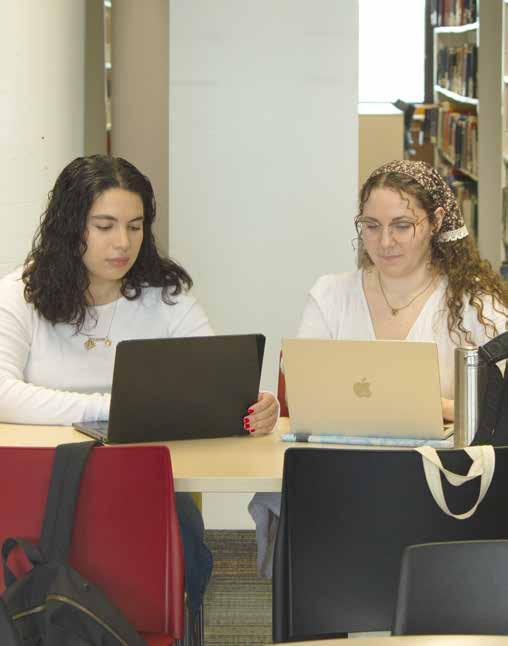
For 23 years, Bob has made it his mission to serve up good food and good times to U of G students. Whether you're in need of a quick meal or a just friendly face, come say hi to Bob at his hot dog stand just east of Branion Plaza.

ABBY COUNAHAN
Welcome to the University of Guelph, baby Gryphons! Entering university comes with a multitude of different emotions: excitement, nervousness, anticipation, fear and everything in between. You may be feeling like you have everything figured out, or like you have nothing figured out. Almost definitely, those feelings will change either way.
Here are 15 tips to carry with you over the next few years:
1. Take the opportunity of being in a new place to grow and discover who you are.
2. Take advantage of opportunities and try new things. You’re surrounded by a diverse group of people with diverse hobbies and interests. Don't be afraid to try new things. This could be attending club fairs, special events held by your College, joining an intramural sports team or staying up to date on events held on campus. Pro-tip: check your student email often!
3. Make a plan for your future. Whether this is planning out your future courses, taking advantage of volunteer opportunities in your field or reaching out to a member of your campus community for advice. Staying on top of your credits and seeking advice is always useful. Remember, it is always okay to change your pathway.
4. Build your community outside of your comfort zone: it’s okay to nurture existing relationships, but put just as much effort into cultivating new relationships. Carry this with you throughout every year of your studies.
5. Don’t get stuck on minor (or even major) setbacks. Whether they arise in your personal life or in your academic life, every day is a new day. A great part of life is evolving and you can’t evolve without overcoming obstacles.
6. Give yourself grace. You will make lots of mistakes, but remember that growth isn’t always a linear path. Remember to show yourself the same amount of understanding that you show to others.
7. There is always somebody in the same boat. Over the next few years the world might feel like it’s ending sometimes. Just know that there are others who procrastinated just as hard, others who got just as bad of a mark and others who feel like they
have no idea what they are doing. Just keep pushing through and know that eventually, the feeling always passes.
8. A bad mark doesn’t define you. It’s almost guaranteed that you will fall short sometimes, everyone does. Don’t beat yourself up over it, the best part of learning is learning from your mistakes.
9. Go to the library, browse the aisles and pick up a physical book–don’t let this resource go to waste.
10. Take a class that interests you over a class that is easy. Sure, it’s nice to take courses that are known as “average boosters,” but you have access to a lot of really interesting courses taught by very passionate scholars. If Ancient Greece interests you, take a course on Ancient Greece.
11. Do not skip the first week of classes. Also known as “syllabus week,” this is a vital part of each semester. Take this as an opportunity to introduce yourself to your peers and your professors. These relationships are very important.
12. Reach out to your professor. It might seem like they have too many students to care about each individual, but this couldn’t be further from the truth. Go to their office hours and make yourself known, it could lead to great opportunities down the road.
13. Don’t always take the easy way out in your studies. You may come across situations where you have the freedom to either challenge yourself or remain doing what you’re comfortable with. The reward of teaching yourself something new is worth it.
14. Work hard, play hard. What a cliche. But seriously, getting a degree is a serious achievement. You are working hard and pushing yourself emotionally, mentally, physically and intellectually. Make sure to allow yourself the time to relax, have fun and make memories in whatever way you see fit.
15. Lastly, enjoy every moment. The exciting times, the stressful times and everything in between. Being a university student is such a momentous period of your life. Take everything in with gratitude and really bask in the moment. It might seem like a long road ahead now, but it will truly pass in the blink of an eye.

Laundry 101: it can be just that simple
It's all fun and games until you shrink your favourite sweater
ALYSSA CUNNINGHAM
You’ve survived course selection, found your way around campus and maybe even figured out how to cook pasta without setting off the smoke alarm. Now comes another rite of passage: laundry. If you’ve ever stared blankly at a washing machine or wondered if mixing darks and lights really matters, this one’s for you. This guide will walk you through the essentials from supplies and tips to laundry room etiquette and how to read those mysterious care labels.
Students living in residence have laundry costs included in their residence fees, so no need to carry coins or pre-load a card. However, if you are in West Residence, the laundry is coin-operated. Each load costs $2 to wash and $2 to dry, so be sure to bring change or budget accordingly. It can also be beneficial to keep a coin jar in your room so you’ll never be in a bind.
Before heading to the laundry room, make sure you’re stocked up on the basics (nobody wants to make that walk of shame back to your room).
• Detergent: Pick your poison. Do you prefer pods, liquid, or powder? All work similarly, but if you have sensitive skin, consider opting for a fragrance-free option.
• Fabric softener: Helps soften clothes, reduce static, and add a fresh scent, but it's not necessary to wash your clothes; it kind of just adds that extra oomph.
• Chlorine or non-chlorine bleach: Can come in a powder or liquid, very good for T-towels, socks, underwear and all white clothes.
• Spot stain remover: Don’t stress when inevitably you get a stain on one of your favourite articles of clothing. If you spray a bit of stain remover on the piece of clothing, gently rub it in and let it sit for the recommended time, you’ll be good to go.
• Dryer sheets: These also help with static and can make your clothes feel extra soft. Also, not 100 per cent a necessity, but it is deeply helpful for not getting static shock while folding your clothes or taking them out of the dryer.
• Laundry basket or hamper: Get one that’s easy to carry, especially if you have stairs or elevators to deal with. Also, pro tip: Get a tall laundry basket or hamper to throw dirty clothes in and a separate one to fold clean clothes in. You’ll thank yourself in the long run when you’re too tired to put away clean clothes but still need to throw your dirty clothes somewhere.
• Mesh laundry bag: This is ideal for delicates like bras, underwear or any clothing that needs to be hung up to dry instead of tossing in the dryer, and helps prevent damage in the wash.
Step 1: Check your pockets
Remove anything that could damage your clothes or the machine, such as tissues, pens, hairpins or gum. One too many lip
balms have been thrown in the washing machine over the years and that hint of chemical detergent never really comes out of it.
Step 2: Sort your clothes
Separate your dark clothes from your light clothes, or if you’re really in a bind, make sure the mixed load is running with cold water. Warm and hot water causes the colours to bleed into your clothes. Additionally, separate a white load so that you can run a bleach load. In a bleach load, you can throw in all white clothes, any colour underwear or tea towels even if they aren’t white (underwear, socks and tea towels are made with a certain dye that doesn’t turn colours with bleach).
Newly purchased clothes may bleed dye, so turn them inside out or wash separately just in case. Also, check the care labels on your clothes. Some items may need to be hand-washed or can’t go into the dryer because they’ll shrink.
Step 3: Pre-treat stains
Use a stain remover (or even a dab of detergent) to treat any tough spots before throwing clothes into the wash. Even nature's own stain remover can work! Lay out your stained clothing in the sun for a whole day, and the sun's rays will lighten the tough stain before throwing it in the washing machine.
Step 4: Add detergent
Follow the instructions on your detergent bottle or pod packaging. Most machines on campus have guides posted on them too. Remember that a little goes a long way with liquid detergent (i.e. not
in pods); you do not need a whole cup of detergent for one load. Too much detergent can thin out the material of your clothes.
Step 5: Load the washer and set a timer
Don’t overstuff! Fill the machine about three-quarters full. Select your cycle, water temperature, hit start and set your timer Laundry etiquette reminder: Not only does leaving your clothes in the washing machine after the load has finished cause mold and mildew on your clothes, but it also isn’t fair to either your roommate or other students using the laundry room.
Step 6: Switch to the dryer
Before tossing your clothes in the dryer, double-check for any items that can’t go in the dryer and clothes that need stain treatment before the washing machine. Heat can set the stain in permanently, so you want to make sure it's fully out before tossing the clothing item in the dryer. For everything else, pick the appropriate heat setting (low for delicates, high for towels), add a dryer sheet if you’re using one and start the dryer.
Step 7: Fold the clothes
Once your set timer for the dryer has gone off, it’s not only helpful for the next person doing laundry, but also beneficial for yourself to immediately take the clothes out of the dryer and fold them in your hamper. And no, that doesn’t mean throw them in the hamper and tell yourself you’ll fold them later because we all know that’s not going to happen and guess what? You’ll be getting ready for class, searching for
that one T-shirt, only to realize it's crumpled in your hamper, more wrinkly than a raisin.
Now that you know what to use and how to use laundry essentials, let's talk about laundry etiquette. Not only for being respectful to your roommates and other students, but also keeping on top of yourself. One of the best ways to stay on top of your laundry is to pick a specific day each week and stick to it. Just trust that waiting until you’re down to your last pair of socks and your emergency sweatshirt never ends well. A routine not only keeps your clothes fresh but also saves you the stress of last-minute loads.
Remember, you are not the only person who needs clean clothes. If you plan to leave the laundry room while your clothes are washing or drying, always set a timer on your phone. Not only can forgetting your laundry lead to wrinkled clothes, but it also creates long waits for other students, or if left long enough, your stuff gets moved (or even dumped out) by someone else eager to use the machine.
And while it’s easy to remember your day-to-day clothes, don’t neglect the bigger items. Towels and bedding should be washed weekly or at least every other week to keep things smelling fresh and free from unwanted bacteria. No one wants to sleep in sheets that haven’t been cleaned in a month. Being respectful, staying timely and keeping things clean go a long way toward making the laundry room a better place for everyone.

Your first-year survival guide from someone who just made it through
FATIMA ASKARY
There is possibly nothing more overwhelming than going from your high school where you know practically every face to a massive university where nobody is familiar. However, as scary as it can be, this can also be an incredibly exciting prospect. There are endless opportunities to explore, learn and grow in ways you least expect.
Here’s some helpful advice from a recent graduate:
You might find your friends in the places you least expect (don’t lose hope!)

There is a huge expectation to find your best friends during O-Week. While this is more than possible, the truth is most people don’t find their friends right away. It might take the entire semester (or year) to meet people you truly align with, or you might find yourself a part of many friend groups before clicking with the right people. All of this is normal. The important thing is to keep yourself open to new experiences and conversations. Your closest friends might arise from situations simply because you were open to having conversations with strangers.
Adding from the point above, while it’s extremely worthwhile to find your friends, the truth is that an important skill to learn is being comfortable with yourself. There will be many instances where you will find yourself alone–a new class, long days of studying or weekends where your friends are not around. By engaging in quality time with yourself, you will find new hobbies, gain self-awareness and increase your confidence–all vital skills that will take you beyond university.
You will fail and that’s okay
Failure doesn’t only look like a terrible midterm grade. It can mean not getting a leadership position or the job you applied for. It can mean miserable attempts at cooking or forgetting to pay your phone bill. It feels awful at the moment, but it’s impossible to grow without failure. Take these in stride and don’t let them stop you
from trying again.
Don’t be afraid of change
Every four months, your entire schedule changes–new classes, new professors and a new routine. Beyond this, as semesters pass, you will change as well. Your interests, passions and career goals will all shift as you gain more experience and knowledge. Being 100 per cent open to changing your mind will open up doors you never thought possible, so keep a growth mindset and recognize that undergrad is all about figuring things out. For many, they leave a completely different person than when they first started.
Grades are not a reflection of your self-worth
Getting your first chemistry midterm grade back will probably not be what you hoped for. Know that not only is that common, it’s expected. Learn from your mistakes, adjust your studying accordingly and ask for help when needed. The most important thing to realize is that you are not your grades. Academic disappointment is inevitable during undergrad, and the less you allow your grades to reflect your self-esteem, the more you will save yourself from a great deal of stress and crash outs. Think of yourself in five years from now. Will you even remember your midterm grade? Probably not.
Lastly (and most importantly) have so much fun!
Your first year holds the least amount of consequence and responsibility that you’ll face during university. Make memories that you’ll look back on with nostalgia when you walk across the graduation stage. At the end of the day, university is equally about self-discovery and making memories as it is about studying and hard work. Striking the balance takes time and effort, but it will be worth it in the end. The first semester of university will always be the hardest. Hopefully some of this advice can keep you going as you figure it all out. Good luck to everyone navigating this new chapter!
miss out on these student discounts
ALYSSA CUNNINGHAM
Between classes, assignments and rent payments, figuring out where to get your groceries might not be at the top of your to-do list, but trust us, it makes all the difference when you need an energy boost before that 7 p.m. class and you actually have a fridge stocked with your favourite foods. To help you get started here’s an overview of some of the main grocery spots in Guelph, what they offer and how students can make the most out of their visits.
Bulk Barn is the place for underconsumers and sustainable kings and queens. Bulk Barn has a Reusable Container Program which lets you bring your personal container or bags instead of using their plastic ones. Along with their program, on “Sustainable Sundays,” Bulk Barn offers 15 per cent off for all customers who bring in their container, even if you’re not a student. However, a perk of being a student is that on Wednesdays, you can receive 15 per cent off on purchases with your student ID.
Walmart is kind of your one-and-done shopping centre. Whether you need groceries, house essentials, skincare or cold medicine, you can find everything and more just in one place instead of going to multiple stores for your needs. While they don’t offer a student discount, Walmart is known for consistently low prices and “rollback” deals that let you stock up on essentials. The two Guelph locations—on Stone Road and Woodlawn Road—are both accessible by bus and worth the trip if you're trying to do a major haul without getting that Costco membership.
No Frills is similar to Walmart with its affordable prices, especially when it comes to produce, proteins and pantry items. It’s also a solid spot for multicultural ingredients if you don’t want to head over to the Ethnic Supermarket. On Tuesdays, students can receive 10 per cent back in PC Optimum points, which can be redeemed for purchases in other stores such as Shoppers Drug Mart.

Metro can be a very convenient grocery store for students, especially when it's located right across from Stone Road Mall. However, it does tend to be on the pricier side. Nonetheless, students can receive 10 per cent off their purchases every day with their student ID. Beyond the basics, Metro is known for its fresh bento sushi, ready-toeat hot table with pre-made meals and a fully stocked deli counter.
With a setup similar to Metro, Zehrs offers bento sushi, a hot table, pre-made meals and a deli counter, i.e. it’s a great option for quick lunches or dinner shortcuts. Additionally, Zehrs gives students 10 per cent back in PC Optimum points with every purchase, just don’t forget to bring your student card along with you for verification. Bonus points about Zehrs is that most locations will have a small Joe Fresh section inside, so you can buy those Pillsbury cookies alongside a cute pyjama set.
Food Basics may not have all the specialty items like a Zehrs or Metro, but it’s definitely the go-to spot for low prices and convenience. You’ll find good deals on the essential food items, a decent-sized multicultural food selection, and the best part: ready-to-eat rotisserie chicken. Another win is that students get 10 percent off their total purchases on Tuesdays. Overall, if you’re only going to take one thing from this article let it be this:
keep your student card on hand, time your shopping trips around discount days and don’t underestimate the power of a good rotisserie chicken.


























ANNU - Animal Science & Nutrition
ALEX - Alexander Hall
ARB - Arboretum Centre
BIO - Biodiversity Institute of Ontario
The Bullring- On-campus living room and coffee shop
BWH - Blackwood Hall
CAF - Central Animal Facility
Cannon, the - Also known as Old Jeremiah Creelman Hall - Marketplace-style eating
CRSC - Crop Science
DH - Day Hall
East Residences
East Village
ECBA - Edmund C. Bovey Building
FS - Food Science
GRHM - Graham Hall
HUTT - H.L. Hutt Building
Johnston Hall
LA - Landscape Architecture Building
LA Pit - Eating area located in Lennox/Addington
Lambton
Lennox/Addington Hall
MAC - Macdonald Hall
MACK - MacKinnon Building
MACN - MacNaughton
MACS - Macdonald Stewart Hall
MASS - Massey Hall
MCLN - J.D. MacLachlan
Mills Hall
MINS - Macdonald Institute
McLaughlin Library – University of Guelph’s Library
Mountain Dining Hall - Located in South Residence
OVC - Ontario Veterinary College
PAHL - OVC Pathobiology / Animal Health Lab
Prairie Dining Hall - Located in South Residence
REYN - Reynolds Building
RICH - Richards Building
ROZH - Rozanski Hall
SSC - Summerlee Science Complex
South Residences - Includes Maritime/Prairie/Mountain
THRN - Albert A. Thornbrough Building
WMEM - War Memorial Hall
ZAV - Zavitz Hall










W a l k -in onl



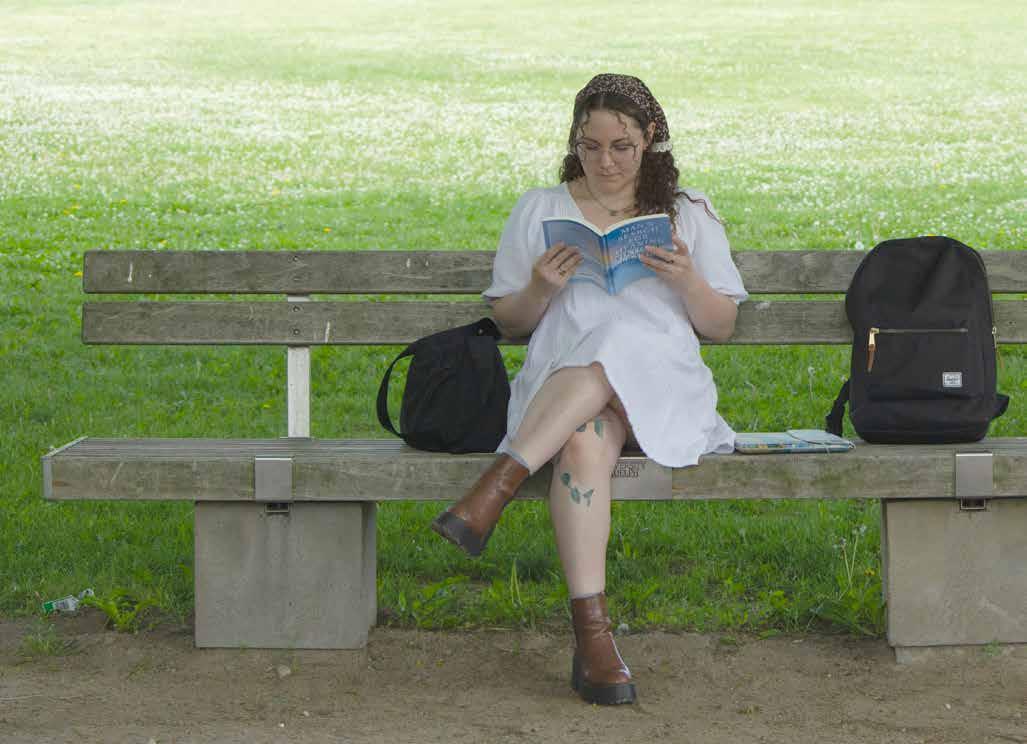
O-Week is often a major highlight in so many students’ university experience. It is the first glimpse into the next years you’ll be spending here, and it’s packed with events, excitement and constant interaction. But for some, this can feel overwhelming. If this is you, there’s no shame in it.
Feeling drained, uncertain or even out of place is completely normal. Chances are, more people than you realize feel the same way. With that in mind, this guide will hopefully help you feel more at ease with your worries and give you the tools to navigate this intense week you’re about to embark on with a little more confidence.
Pick your battles
During the peak of O-Week, there will be endless amounts of events offered from various clubs, associations and programs. You might feel like it’s easier to not attend any event or that you must engage in a large selection of them.
It’s important to find a balance that feels right for you, between how many events you attend and the variety they offer.
Try for a mix of events; some relaxed, some higher energy, some interest-based and so on.
Use solo time strategically
When it comes to protecting your energy, balance is key. While you’re in between attending events and socializing, make sure you are taking some time to charge your social battery. There are so many things that can help you, such as taking a walk, journaling, listening to music, watching a comfort show–the possibilities are endless. Above all, it’s important that you recognize habits that allow you to feel more comfortable and reset.
Small talk survival
Constant interaction can feel draining (or even intimidating) for introverts. The good news is that there are a couple of simple ways that can help ease social anxiety, especially when meeting new people.
First, prepare a few talking points. It helps to have a few questions in your back pocket to break the ice. Some can be basic, such as what’s your name, what program are you in, where do you
live on or off campus. But don’t be afraid to ask questions that dig a little deeper. Ask how they like to spend their free time, where they’re from or what they did over the summer. Even just having a few in mind can make jumping into conversation easier. And remember, conversations often steer themselves.
Second, find small ways to practice mindfulness. Try starting your day with some meditation, take deep breaths before entering a social setting or check in with yourself throughout the day. These techniques can help ground you and reduce any jitters you might get.
Finally, as an extra reminder, being a good listener is a major part of good conversation. As introverts, the challenge is often speaking and not listening. But just remember that there is power in being present, asking thoughtful questions and letting the conversation flow naturally. Not all conversations have to result in lifelong connections.
Find your people
Not everyone you talk to will become your forever friend, and
that’s ok! What matters is putting yourself in the right environments to meet people you genuinely connect with.
Attending a club meeting is a great first step. It gives you a chance to explore communities that match your interests and values. Don’t feel awkward about your interests because chances are that others are into them as well. Interest-based meetups are naturally more intentional than general social events like parties, which makes it easier to find people you truly click with.
If you do find someone you hit it off with, don’t hesitate to reach out again. Maybe you can go to another event together. Building friendships takes a bit of initiative, but it can be worth it in the end.
ahead with tech
Everything is online nowadays. There is so much access to apps, online forums and social media accounts. These can all help you gauge what events are available and what you may be comfortable with. Follow the university’s main accounts on Instagram, including @uofguelph, @
uofgstudentexp and your associated program’s account to stay connected.
Download the IAmAGryphon and SafeGryphon apps, as they will be very handy during this busy week.
Finally, keep up with getting people’s social media accounts and their phone numbers for easy communication and updates.
A final word on O-Week (and beyond)
O-Week is notoriously a little chaotic, but if you know your boundaries, it almost always ends up being a fun and memorable time. It’s a major part of your introduction to university life, but it’s not the end-all be-all for your entire four to five years here.
As this guide wraps up, here are a few reminders from one introvert to another: you don’t have to do everything, you’re not the only person feeling this way and most importantly, you already belong–you just have to find your sweet spot.
The University of Guelph welcomes you with welcome arms. You are going to make so many wonderful memories.
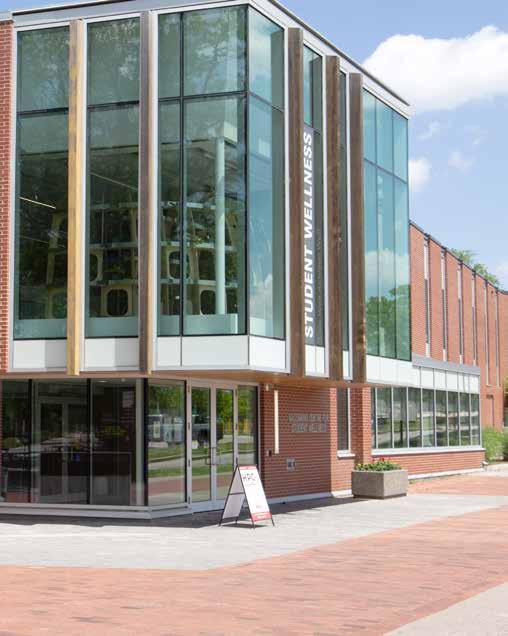
Already covered by your student fees, these services can save you time, money and stress–if you know where to find them
The most important thing to achieving success at university (after attending class) is keeping well, in terms of both your mental and physical wellbeing. There are many ways to keep up with the stress and the pressure you may feel while attending university, such as taking walks regularly, meditation and more.
Routine solutions like these can be immensely helpful to the right people, but not all issues that you may experience are so easily solvable. And of course, a ten-minute breathing routine won’t update the prescription of your glasses or keep your teeth clean.
people are facing as well.
There are also therapy groups which offer longer-term support from both professionals as well as peers who might be going through similar issues. If you’re an international student struggling to adjust to life in Canada, they also provide support through the GuardMe student support program.

However, as a part of the compulsory fees attached to your tuition, you are already paying for many of the great benefits accessible to you on campus as a student at the university.










Part of those fees goes towards the Athletics Centre, which gives you access to drop-in recreational sports, intramurals, virtual fitness classes and the fitness centre (which requires an additional fee).
You’re also paying for health insurance through mystudentplan.ca. You can put this towards a myriad of health services, such as an eye exam, either in the University Centre (UC) or off campus. This insurance can also go toward services offered by the Health and Performance Centre (HPC), which provides a litany of services such as physiotherapy or chiropractic treatment.
As a first year student, an important caveat is that while you are technically covered already, to actually use your benefits, you need to get your benefits card online and then register using Canada Life’s online service. Be sure to use your Guelph email when you register.
This service can match you with a counsellor who speaks your native language and can hopefully better understand your circumstances. Do bear in mind that the drop-in hours are first-come, first-served, and you will likely have much better luck scheduling in advance. If you can’t meet with someone as soon as you would like, there are a variety of self-guided resources, which you can find online at wellness. uoguelph.ca/counselling.
In case you want a check-up or have any concerns about your wellbeing and want a professional opinion, you can book an appointment to see a physician for any of the reasons you might want to visit your family doctor.
You can also get immunizations and flu shots either through walk-in appointments held during the fall or by booking an appointment. Their nursing services can also administer other prescribed medications, if needed, through an appointment.
You can also speak with nurses to follow up about any information that you might like clarified after an appointment. If you get sick and require a medical note, the form for that is also found here. They also provide dietitian services, either through workshops or by referral for a one-on-one appointment.





This coverage is good until next fall, but be sure to read up on the Central Student Association (CSA) website or mystudentplan.ca to learn more about how much this coverage will give you, as well as all other particulars relating to it. You can find the HPC inside the J.T. Powell Building, located near the east end of campus. There, you can also find other student wellness services.
This includes their counselling services, which you can attend either by booking an appointment or during scheduled drop-in hours. If you’re struggling with anything from self-esteem to stress to homesickness, talking to a professional can be a great step towards understanding and working through these problems that so many other
In the UC, you will find almost anything else that you might need regarding your health. There is a pharmacy, which should be able to dispense any prescription medications you might have. They also provide safe disposal of unused or expired medical products, as well as syringes and needles. You can also book an appointment to see an optometrist who can provide you with an eye exam or an updated prescription for your glasses. There is also a dentist office in the UC, where you can find any service you would expect of a dentist, such as cleaning and whitening.
Finally, you can find the CSA’s Health and Dental Insurance Office if you have questions or concerns about your insurance plan and want to speak with someone directly.
professors
ASHLYN STUART
Entering a bachelor of science program can be both exciting and daunting. Hearing about classes like “Killer Chem,” on top of adjusting to life away from home and juggling new pressures can feel overwhelming.
Read this guide for the best tips from recent science grads, program counselors and first-year biology professor Dr. Terry Van Raay.
Asking for help or group study can feel uncomfortable at the beginning, however it can often be the best way to learn and grow as a student.
Van Raay recommends going to office hours, talking with your teaching assistants and attending Supported Learning Groups (SLGs). He encourages students to use these resources “even if it's to review work you know.”
Supported Learning Groups are free, peer-led study groups offered at the McLaughlin Library. They run twice a week for many first year science and math courses like chemistry and physics.
SLGs are “a great way to stay on top of your studies and make some new friends,” shared Ashley Schotsman, an academic assistant with the B.Sc. Academic Counselling Office.
“I highly recommend going to SLGs during your undergrad,” said biomedical science grad Sanya Sareen.
“Studying for tough courses becomes much more enjoyable when you can struggle and learn together,” Sareen added.
A common challenge among first year students is managing a heavy course load while also adapting to a new learning style.
“There are so many assessments in several of the first-year courses that it is easy to forget what is due when,” Van Raay explained.
Recording the due dates for all of your assessments in each of your classes on a calendar can help you manage your time. He also recommends taking advantage of all opportunities to boost your grades.
To stay on track with your courses, you can follow your Schedule of Studies in the Undergraduate Calendar. This is where you will find the courses that you need to take and you can plan ahead to ensure you meet all prerequisites.
If you have questions about course selection and planning out your degree, connect with an academic advisor at bscweb@ uoguelph.ca.
Be open to new experiences and get involved
By joining clubs and attending events, university becomes something more than just
academics.
Sapphire Aberdeen, a biochemistry graduate, advises students to “actively seek out opportunities because they won’t just fall into your lap.”
“Join clubs, volunteer and take time to connect with your professors, especially if you’re interested in research opportunities,” Aberdeen said.
It’s best to take classes you genuinely like over ones you think will be easy. Those seemingly easy courses will be much harder if you have no desire to attend class.
A course can be appealing for various reasons. Sareen shared that MCB*2050 was her favourite because the SLGs made it fun. Aberdeen loved MCB*3010 because it was taught by a great professor. For Melayna Fortier, a biomedical toxicology graduate, HTM*4050, a course all about wine stood out.
Regarding electives, Schotsman says B.Sc. advisors suggest using them to “explore a topic you never considered learning more about,” or as a “great tool to add depth to your degree in pursuit of a minor, a degree-credit certificate, studying abroad or simply helping to balance your more intense science courses.”
University can be difficult. Making time for yourself and having self-compassion are necessities, not luxuries.
During hard times, Fortier underscored the importance of perseverance and resilience. “If you fail a course, what’s the worst thing that happens? You take it again.”
“Give yourself grace when things feel overwhelming,” Schotsman shared.
“Don’t be afraid to ask for help,” Aberdeen said. “You never know where it might lead you.”
Both Van Raay and Sareen discussed the need to balance studying and having fun.
“Study hard and stay focused, but also carve out time to enjoy yourself, have fun and grow beyond the classroom,” Sareen said.
“Reward yourself for working hard,” Van Raay recommends.
He suggests supporting U of G’s varsity teams and attending games as a “great way to blow off steam.”
Congratulations on starting what will be a challenging but rewarding journey! Among the physics quizzes and Mastering Chemistry homework, try to savour your time as a science student.
As Sareen put it, “the four years of your undergrad will fly by faster than you can imagine.”


RACHEL FIORET
Aco-operative, most commonly called a co-op, is a business that is democratically owned and managed by its members. Participating members of a co-op often have similar needs and interests that the organization supports, which increases their commitment. The Guelph Campus Co-op follows this method, as they are owned by students and work to support students.
According to its website, the organization’s mission statement is: “the Guelph Campus Co-op will be a model organization of co-operative action, owned and controlled by students, for students.”
They are “committed to serving the best interests of our membership by operating effectively in areas significant to student life, focusing on the provision of housing and textbooks.”
The co-op also serves the interests of student members by encouraging student participation in the form of empowerment, leadership and responsibility.
Guelph Campus Co-op membership
A membership at the co-op opens the door to financial savings on textbooks and housing, and also creates professional opportunities within the board. The membership is a one-time fee of $15.
As a member, you can participate in the democratic process that manages the co-op, you can run for the board of directors and you can apply to live in the off-campus co-op housing. A membership also saves you five per cent on the purchase price of textbooks for the next four years at the Co-op Bookstore on campus.
Co-op Bookstore
Operating since 1913, the Co-op Bookstore is the original bookstore on campus. You can purchase new, used and digital options for courses at the Co-op Bookstore, located in Johnston Hall-Rm 037.
The five per cent discount applies to everything sold in the bookstore except for digital codes ordered online. To reach all budgets and learning styles, they offer a variety of learning materials within the store. You can also purchase your membership when you buy your books there if you haven’t yet.
The bookstore also offers a textbook buyback program, where you can sell your used textbooks during or after the semester.
The prices they offer for specific textbooks fluctuate throughout the year depending on the supply and demand of courses.
As stated on its website: “We have a long and proud tradition of service and innovation on the University of Guelph campus, offering full counter service with friendly, helpful staff who will get your textbooks for you, and review your course needs with you.”
The Guelph Campus Co-op offers housing to student members at an affordable price, with close proximity to campus. They offer lodging houses, apartments and townhouse apartments that are below the conventional market rates. They can offer more affordable housing because the mandate of the operation is to serve students, not to make profits.
Also, housing members are required to participate in the maintenance of the household, which reduces the overall costs. Participation includes cleaning and committee work to develop policies for the co-operative. They also have a mandate to pursue environmental initiatives wherever possible. This includes thoughtful additions to their properties like low flush toilets, energy-efficient lighting and energy-saving appliances. The Co-op continues to look for ways to minimize their impact on the environment.
If you are a student and interested in living in one of the co-op housing options next year, they recommend that you apply to the waitlist early, as there are limited number of units that become available each year.
All members of the Co-op are eligible to sit on the Board of Directors. They elect new directors at the annual general meeting each September. The Board of Directors is a majority student membership, which means that students make the decisions for the organization.
To be a part of the board, they require that you: are available for monthly meetings, are willing to attend board training sessions, are willing to attend strategic planning events, have a general understanding of the role of a board member and respect the Co-op’s values of honesty and social responsibility.

The seven cooperative principles
As shared on its website, the Guelph Campus Co-op upholds the seven co-op principles. The set of principles can be dated back to 1844, when the Rochdale Society of Equitable Pioneers defined them to be used as overarching guidelines for the operations of their co-op.
The original principles established by Rochdale were officially adopted by the ICA in 1937, updated in 1966 and then integrated as the set of seven Principles within the Statement on the Co-operative Identity in 1995.
The principles are:
1. Voluntary and open membership
This means that everyone can use their services regardless of discrimination.
2. Democratic member control
Members actively participate in setting policies and decision-making. Elected representatives (inclusive of all genders) are accountable to their membership.
3. Member economic participation
Members contribute equally to and democratically control the capital of the co-operative. Part of the capital is usually
the common property of the co-op.
4. Autonomy and independence Co-operatives are autonomous and controlled by their members. If they enter into agreements with other organizations (including governments), they do so on terms that ensure democratic control by members.
5. Education, training and information Co-operatives provide education and training for their members, elected representatives, managers and employees so that they can in turn contribute to the development of the co-op.
6. Cooperation among cooperatives Co-operatives work together through local, national, regional and international organizations to serve their members best and to strengthen the co-op movement.
7. Concern for community Co-operatives work for the sustainable development of their communities through policies approved by members.
To learn more about the Guelph Campus Co-op, visit their website: guelphcampus.coop.
Yes, we have a lot of squirrels
ARTICLE AND PHOTOS BY LAURA APBLETT
Thanks to Guelph’s numerous parks, wilderness areas and green spaces, many different types of wildlife call this city home. Living alongside wild animals is frequently enjoyable and many people appreciate their opportunities to observe the city’s biodiversity.
With great access to wildlife, there can also be conflict between humans and animals. In order to avoid trouble with Guelph’s non-human residents, here is a guide to getting along with some of the local wildlife.
The Canada goose is one of Guelph’s most familiar (and perhaps notorious) residents. Often regarded as one of the nation’s icons, Canada geese are a habitual sight in the city’s urban parks.
However, it is important to remember that geese can be aggressive towards humans and pets, especially during nesting season. If a goose becomes stressed, it may hiss at you, chase you or even bite you. Following a few simple rules will
prevent these unpleasant encounters.
Always ensure to give Canada geese plenty of space. Do not try to approach them, feed them or antagonize them in any way. If you have a dog, try to give the geese an even wider berth.
Also, be patient as flocks cross walking trails and roads–they share the same space as us.
Mallard ducks are another common avian sight in Guelph. They can often be found in pairs or small groups in the local waters.
The city recommends that people do not feed the ducks (or any wild animal), as this can lead to problematic encounters with them. However, if you can’t resist the temptation, just be sure to bring along the right kind of food.
Foods such as corn, peas and leafy greens are nutritious and likely to be enjoyed by ducks. A huge misconception is that bread is good for them. In reality, bread does not provide the birds with proper nutri-


tion and in large enough quantities, it can even lead to health issues.
Guelph is home to several populations of turtles. Ontario has eight species of turtles, all of which are threatened or endangered.
Road mortality is one of the top reasons for turtle deaths. It is critical that drivers watch out for turtles crossing the road, especially during egg-laying season in the summer. Always try to stop for turtles when it is safe to do so.
If you are comfortable, you can also help a turtle cross by picking it up by the shell and carrying it in the direction it is travelling. Snapping turtles will need a bit of extra caution, but they can still be carried by using your car mat.
If you encounter an injured turtle, please call the Ontario Turtle Conservation Centre at 705-7415000.
If you find a turtle nest in a dangerous location, you can call the Rare Charitable Research Reserve turtle hotline at 226-962-6885.
Another one of Guelph’s most familiar residents is the squirrel. The city’s two main species are the American red squirrel and the eastern grey squirrel. However, you may notice that the squirrels actually come in three colours: reddish-brown, grey and black.
The black squirrels, which are common in Ontario but rare in most other parts of the country, are actually just a variation of the eastern grey squirrel. Their colour is often a surprise to people from outside the province.
There is a misconception that squirrels are carriers of rabies. In reality, rabies is virtually never found in small rodents.
Rabies is rare and fatal, but it does not spread easily though animal populations in the city thanks to dedicated community health efforts.
While the risk of the disease is extremely low, it remains a threat. This is why it’s important to be aware of the signs of rabies and what to do if you think an animal is infected.
The primary sign of rabies is a change in behaviour. Wild animals that seem uncoordinated or unreasonably aggressive may be infected. Excessive drooling, paralysis and seizures are also typical symptoms.
In Ontario, bats, raccoons, skunks and foxes are the most common carriers of rabies. If you come across an animal that is showing
signs of rabies, you should call the rabies hotline at 888-574-6656 for terrestrial animals or the Canadian Wildlife Health Cooperative at 866673-4781 for bats.
If you are concerned about having been exposed to rabies, you should call the local public health office at 1-800-265-7293.
If your pet is exposed, you should call your veterinarian. It is the law that cats, dogs and ferrets be immunized against rabies. Paying attention to animals and acting when you are concerned not only helps the local wildlife, but it can protect human health as well. When it comes to any animal, providing plenty of space, staying on the lookout and keeping food and other attractants out of reach are the keys to peaceful relationships.












The first 50 new followers get a $10 gift card to the Brass Taps.

Follow and DM us “Hi Ontarion” by September 30th to enter!





Are you considering a career in � ournalism or communications?
Do you want to join a team of committed writers?

Open to all undergraduate U of G students, our
� enior Volunteers get training, opportunities, and experience unlike any other on campus by working alongside our staff in a real newsroom.
� enior Volunteers qualify for U of G’s Professional and Career Development Record, which helps students officially document their volunteer experience.
As a � enior Volunteer, you’ll:
• Attend exclusive skill-building workshops
• Get coaching and mentorship from experienced editors


• Build a published portfolio
• Reflect on your growth and make it official














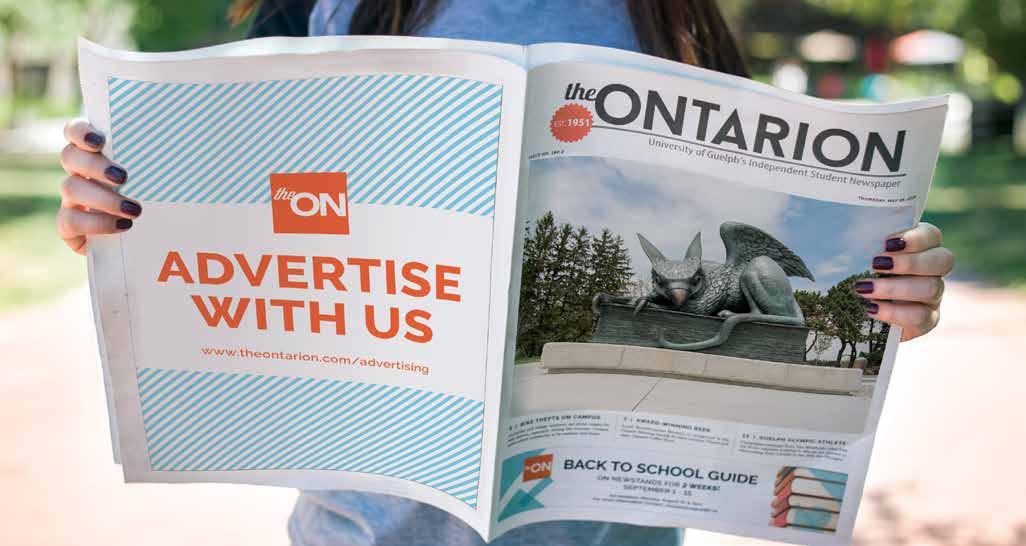
If landmarks could talk, what stories would they tell?
ARTICLE AND PHOTOS BY RACHEL FIORET
As you stroll across campus this fall, take time to visit the iconic landmarks that have helped shape the university over the years. Along the way, learn about the history and lived experiences of students from the past century.
Participate for a chance to win a gift card!
The Ontarion is offering $10 gift cards to the Brass Taps to the first 10 students who send us a selfie at each of the landmarks mentioned in this story. Please send your photos to outreach@theontarion.com by Sept. 30 for a chance to win.

The Portico
One of the oldest landmarks on campus, The Portico was originally used as the front entrance to the Frederick W. Stone farmhouse in 1874. This was the first building of the Ontario School of Agriculture, which is so popular today. The Portico was moved to the Johnston Green to celebrate and remember the founding of the Ontario Agricultural College.

The Cannon
The Cannon, also known as Old Jeremiah, has represented the Gryphon spirit for decades. It’s been on campus for over a century with its arrival in the 1880s, and has been a target of student pranks ever since. For years, students would move the cannon across campus overnight, and the university community would search for its new location
the next day. This tradition became a campus staple until a rumour spread that it was seen on the top of the McKinnon Building, which caused it to be permanently cemented into the ground at Branion Plaza. However, students needed one last prank. Sitting in fresh cement, Old Jeremiah was originally facing the north end of campus, until students turned it to face the Dean’s Office in the University Centre. To learn more about painting The Cannon, read the story on page 39.

Built in 1901, The Bullring has held an important role on campus over the years. To learn about the history of The Bullring, read the story on page 38.


Hall
It’s unknown if at the time of construction in 1932, the campus community believed that Johnston Hall would become one of U of G’s most recognizable buildings. Nearly 100 years later, the space continues to fulfil its original purpose as a student residence and administrative building.
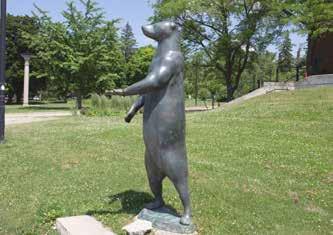
A modern statue designed by Carl Skelton, the Begging Bear was installed in 1999. This statue is a metaphor to protect native animals against human encroachment on the environment. Over the last few decades, this artwork has become an interactive piece, as students frequently dress it up for holidays like Halloween.

Statue
Unveiled in June 2014, the Gryphon Statue is a more recent addition to campus that represents the past, present and future of the University of Guelph. The project cost $300,000 and was funded by donations.
So you’ve made it through residence applications, course registration and O-Week alive, but now you’re struggling with deciphering the bizarre language used daily by the academic community?
Maybe you can’t tell your MCKN from your MCLN or your REYN from your ROZH? Whether you picked up this paper from the UC or the GRC, this article has the answers for what any of that even means.
You might have already looked at your schedule to find out where your classes are, and while websites like ClassFind are generally great for getting you where you need to go, you may find that some classes aren’t on there. Some rooms weren’t originally intended to hold lectures, or you might have a seminar in a different building from where your class is held.
It’s really important to know how to decipher the university’s hieroglyphs, especially come exam season. You will typically find out when and where your finals are held the same way you find out where your classes are, through your schedule on Web Advisor. Only a handful of professors typically go out of their way to mention where the final is held, and it won't even help you if you don’t know what a ‘ROZH’ is. This becomes especially confusing if you have one or multiple exams held in the score of Scottish buildings with the prefix
MAC.
In your first year, a great deal of your lectures will be held in Rosanski Hall (abbreviated ROZH). This building is centrally located on campus, right next to The Bullring. It holds some of the largest lecture theatres on campus. This is especially important for first-year classes, which will have a lot of extradisciplinary students taking them as electives. You will also likely have quite a few of your exams here. The largest rooms, located on either side of the main entrance, have stairs that lead directly to the balcony seating, if that suits your preference.
The most confusing case is the series of Mac buildings. The most important one generally is the McLaughlin Library, though that one is also the easiest to find, and is not typically referred to with any abbreviation. There is, however, the J.D. MacLachlan Building (abbrev. MCLN) which shares a very similar name and houses lectures. It is on Alumni Walk, which is right beside the library.
The Mackinnon Building (abbrev. MCKN) across Winegard Walk from the library houses the School of Languages and Literatures (abbrev. SOLAL) faculty as well as many classrooms where smaller lectures and seminars in the humanities might be held.
There is also Macdonald Stewart Hall (abbrev. MACS) and the Macdonald Institute (abbrev.

MINS), which are both located in the north end of campus, across College Avenue. These buildings primarily house the study of economics, marketing, hospitality and nutrition.
The Macdonald Institute, which first opened its doors in 1903, actually predates the University of Guelph. The University was formed in 1964 when it merged with the Ontario Veterinary College (OVC) and the Ontario Agriculture College (OAC). Students attending the OVC for the Doctor of Veterinary Medicine
(DVM) program will typically be referred to as OVC students.
Students under the OAC will usually be seen on campus wearing their signature leather jackets, and are colloquially called ‘Aggies’.
ence might just say that they are studying Neuroscience.
Most of the doctoral programs offered at U of G are Doctor of Philosophy, or PhD programs. Despite the name, you can have a PhD in fields other than Philosophy. Anyone who completes a doctoral program is conferred the honorific “Dr.” and it is polite to address them with the title they’ve earned.


Generally, students in other categories may refer to their area of study by either an abbreviated title of their degree program, such as B.A. for Bachelor of Arts or M.F.A. for a Master of Fine Arts; or by the major they are pursuing, like a student in the B.Sc. program majoring in Neurosci-
Hopefully this guide helps you navigate all of the niche abbreviations that students use on campus.
Charge your laptop and fill your to-go mug for a semester full of classes
ARTICLE AND PHOTOS BY RACHEL FIORET

One of the largest lecture halls on campus, with a lecture theatre that has space for up to 600 students. Whether you’re in science, arts, engineering or any other field, you’ll likely have at least one class here in your first year.
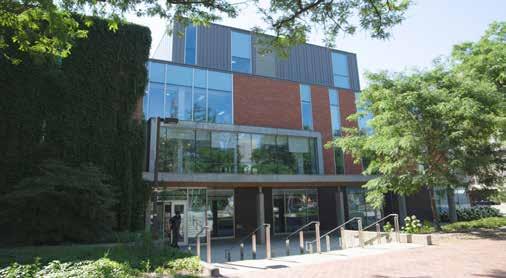
With average to small sized lecture theatres, you’ll likely spend more time here in your second and third years of study. The close proximity to the bus loop and convenient Tim Hortons makes this a great place to study.


While confusing to navigate, the
and incredible views of campus. With its central location
campus, you’re never too far from your next class.

Read The Ontarion
Touch the Gryphon’s beak before an exam for good luck
Paint The Cannon and camp out overnight
Admire the exhibits at the Art Gallery of Guelph
Try the iced coffee at The Bullring
Grab a hotdog at Bob’s Dogs and listen to Bob play the guitar
Picnic with friends on the Johnston Green Study at Centurion till midnight
Try the innertube water polo intramural
Leave a message in The Bullring bathroom
Take an elective class that’s unrelated to your major
Sit in on a lecture that isn’t one of your classes
Go to the Frosty Mug
Cheer for Guelph at Homecoming
Try a workout class at the Athletics Centre
Sign out a book at the library
Discover your favourite coffee order
Visit the Donkey Sanctuary of Canada
Walk along the cow path and say “hi” to the cows
Play disc golf in the Arboretum
Try honey from the Honey Bee Research Centre
Join a club you never thought about joining before
Attend a show at the Guelph Little Theatre
Win Brass Taps trivia
Learn how to line dance at Aggie Pub
Order a personalized pizza at Creelman Hall
Surprise a friend with coffee during exams
Write for The Ontarion
Consider changing your major (and then change it)
Email a professor to say “thank you”
Study abroad
Change your mind about something important
Explore your sexuality
Keep a journal about your time in university
Volunteer for a cause that matters to you
Make a study playlist
Get dinner alone on campus
Make a LinkedIn profile
Ask a question in a lecture
Go to College Royal
Tell someone they inspire you
Learn a new language
Create your dream schedule
Ask a professor about their career path
Explore the areas of campus you never visit
Ask for help when you need it
Attend a campus spiritual or faith-based event to learn more about it
Learn about the history of a building you have class in
Get a campus job
Try a research position
Keep a course reading that changed your perspective on something
Say yes to something that scares you
Take a break when you need to
Discover your boundaries
Learn something about yourself
Practice yoga
Start your morning with affirmations
Snowshoe across the Johnston Green
Get haunted by the ghosts in the library basement
Canoe the Speed River
Visit the Guelph Farmers Market
Dress up the Begging Bear
Try the grilled cheese in Mountain Hall
Buy something at Fair November
Ask your crush for notes
Go to class on St. Patty’s Day
Explore your faith
Climb the rock wall in the Athletics Centre
Wear your Halloween costume to class
Get lost in the corn maze at Stroms
Vote in a CSA election
Debrief your night out over friends
Host friendsgiving
Order McDonald’s at 2 a.m.
Study in a building you’ve never been in before
Go to Janus Books
Discover your favourite cafe in city
Stroll around the Arboretum enjoy the fall colours
Make your own pottery at with Clay
Study on every floor of the library
Get dinner with friends at the Craft Kitchen & Ale House
Walk downtown with no destination in mind
Take a photo with the Gryphon
Learn how to do laundry
Find the best place to nap on campus
Go skating at Market
Stay up all night talking to friends
Say yes to everything for a day
Spot ground near the University Centre
Hand write al your notes for a lecture
Leave a positive note in a library book for someone to find
Open a textbook and realize you didn’t actually need to buy it
Wear your U of G hoodie to class
Learn how to play an instrument
Go grocery shopping with friends
Find your personal style
Discover what you want even if it’s not what you expected
Watch the snow fall from the library
Find your favorite lecture seat
Try food from one of the food trucks in Branion Plaza
Graduate
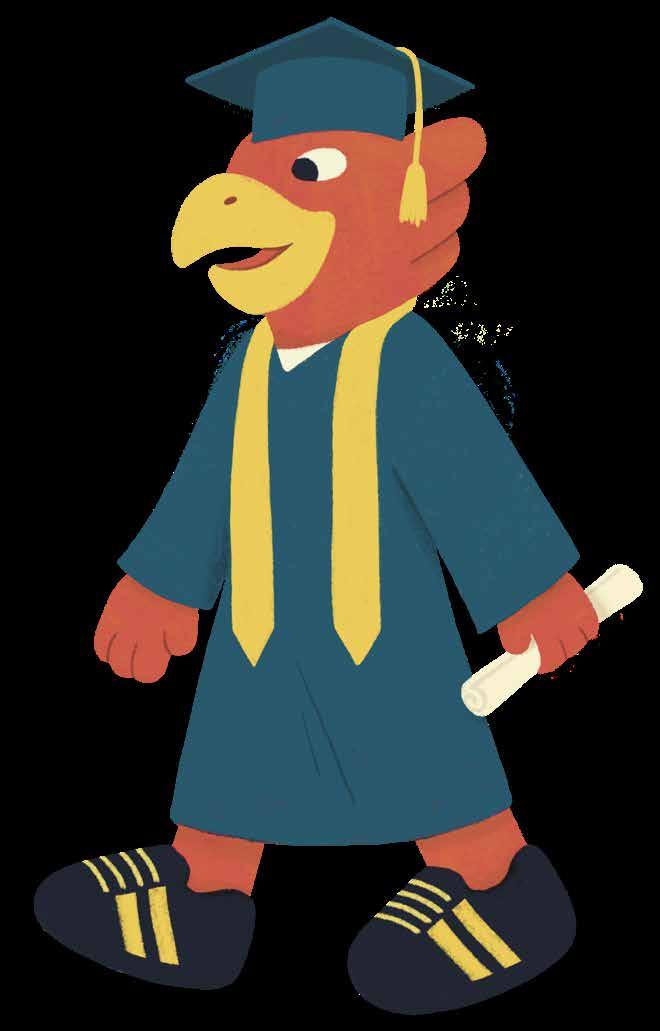



OPIRG Guelph works to bring about greater environmental and social justice through research, education and activism.
JOIN A GROUP * ATTEND AN EVENT OR TRAINING MEET GREAT PEOPLE * VISIT OUR LIBRARY GET INSPIRED TO CREATE POSITIVE CHANGE!
Our office is located on campus at 24 Trent Lane, beside Maid's Hall (check our social media for office hours and accessibility)








opirgguelph.org guelphopirg @opirg guelph opirg guelph













The O n tarion is a l wa passionate and crea t o join o u r t e a m o f copyeditors, photog and illustrators. No experience needed! For more information email outreach@theontarion.com




BY LUCCA MAGGIOLO









Have you ever been scrolling on socials and suddenly you are on a deep dive of “What’s in my purse” videos?
A girl’s purse is where you will find the essentials and of course the just in case items.
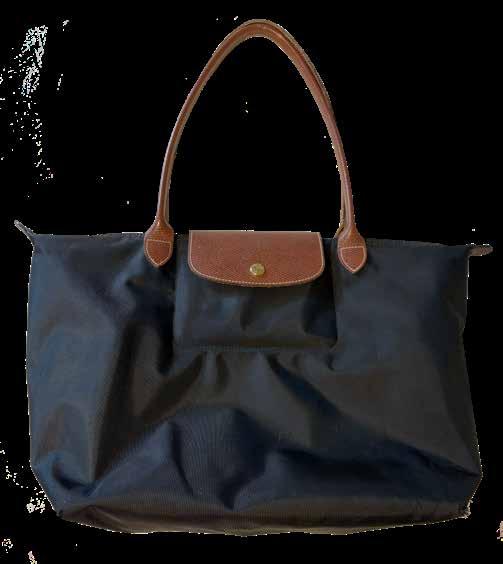









STEP 1:
Sort your laundry by colour
STEP 2:
Load washing machine and choose water temperature (cold, warm or hot)
STEP 4:
Remove clothes and place in dryer
STEP 5:
Fold all clothes and put them away in your dorm
STEP 3:
Add detergent of choice and start washer
1. Pick a Saturday morning activity:
a) Sleeping in and grabbing a coffee
b) Heading to the Farmer’s Market
c) Going for a hike or bike ride
d) Thrifting or finding an artisan fair
2. Choose a soundtrack:
a) Classical piano or violin
b) Podcasts about selfgrowth
c) Upbeat playlists from Spotify
d) Local indie bands
You love to relax and recharge. Enjoy a weekend perusing bookshops, bouncing between coffee shops and working on your creative projects like art or writing at the Royal City Park.
3. What’s your favourite snack?
a) A croissant from Centurion Coffee
b) Leftovers in a container
c) Veggies and hummus
d) Something from the grocery store deli
4. Pick a place to explore in Guelph:
a) The Bookshelf
b) Your clean, organized apartment
c) The Guelph Grotto
d) A pop-up event
Mostly b’s: tHe productive weekend
You are productive and organized, and you want your weekends to reflect it. Enjoy your time off by keeping your space tidy, meal prepping and planning for the week ahead. Focus on self-growth by listening to your favourite podcast during a walk.
5. How do you spend a Sunday afternoon?
a) Journaling at the park
b) Grocery shopping and organizing your weekly todo list
c) Going for a long walk around your neighborhood
d) Looking for new music
6. How do you relax after class?
a) Taking a nap
b) Cleaning your room
c) Attending a workout class at the gym
d) Reading poetry
Mostly c’s: tHe active weekend
You love to stay active at all times of the week. Try a new sport like rock climbing at The Guelph Grotto or canoeing in the Speed River. Go for a hike in the Arboretum and enjoy your time outdoors.
7. What’s your favourite way to hang out with friends?
a) Cozy board game night
b) Patio dinner and yap
c) Frisbee in the park
d) Speakeasy night
8. Pick a drink:
a) An oat milk latte from your favourite cafe
b) Herbal tea
c) Freshly-squeezed juice or a smoothie
d) A craft beer or cider from a local brewery
9. Choose an elective class:
a) Creative Writing
b) Organizational Behaviour
c) Anatomy and Physiology
d) Art History - Medieval Art
Mostly d’s: tHe alternative city explorer weekend
You are curious and love discovering hidden gems. Explore downtown Guelph from unique one-of shops to local bands with pop-up events you can attend. Wander around the Art Gallery of Guelph and check out the Red Brick Cafe.
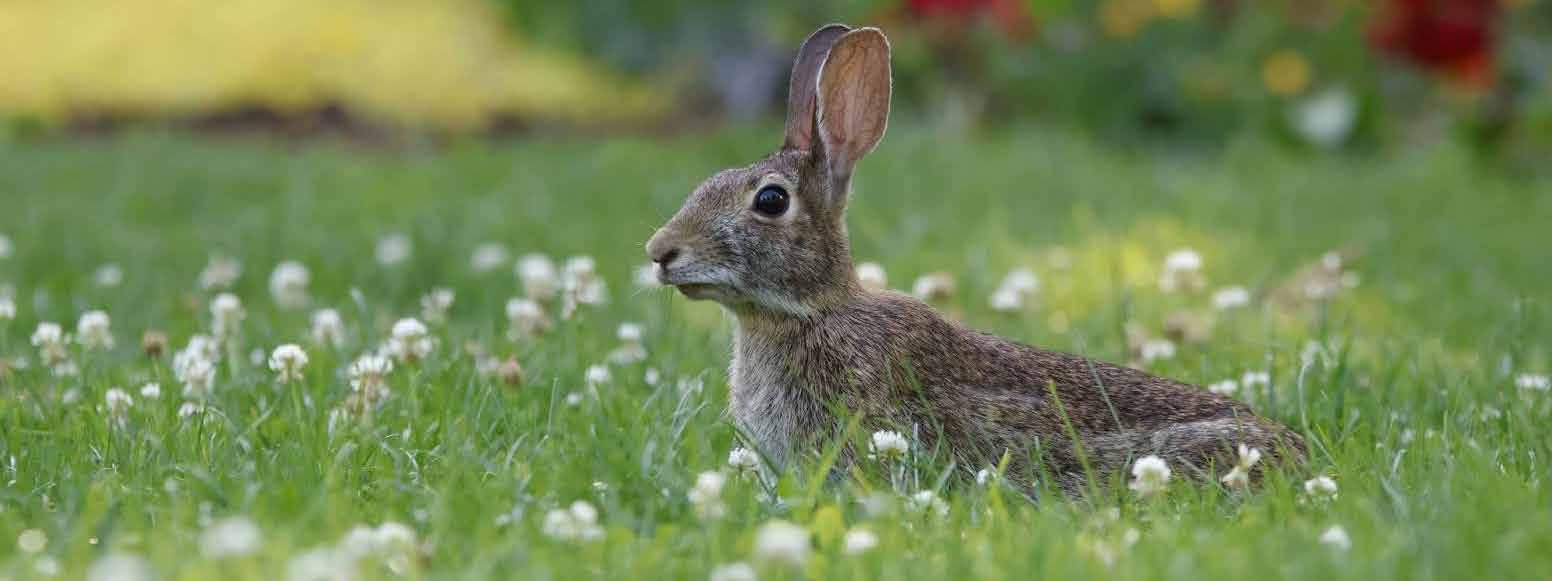

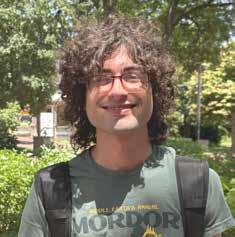

We had a lot of welcoming activities with the university and one of those was the silent disco. It was this thing that the university hosted near the gym where everybody came in, they gave us headphones, we danced around music and my entire floor went. It was a really good bonding activity and we all became really close friends after that.
Saijal Soora
3rd year, Justice & Legal Studies
My biggest core memory of first year was when me and everyone in my residence, because I was part of the eco house in the East residence, went on a ghost walk in the city of Guelph. It went super late till like 12. We had a really great time walking around Guelph and hearing all the interesting stories in the history of the city. Afterwards I had to bus back home to my place in Mississauga and the bus didn’t arrive. I was stranded at this bus stop till like one in the morning. It was such a crazy night, both fun and not so fun at the same time. That is a memory that sticks with me ever since first year.
Adam Martins
2nd year, Biochemistry Co-op
Running into a friend I had made in one of my classes and then realizing we had literally every single thing in common with each other. From that moment on, we’ve been best friends ever since and studying together all the time.
Jenna Harris
5th year, Biochemistry






OPIRG Guelph Open House and Craftivism
• 11 a.m. - 4 p.m.
• OPIRG Guelph Office, 24 Trent Lane
• An open house where people can tour the space and learn more about the OPIRG organization and the services provided. There will be tie-dying and possibly screen-printing with premade designs available!
Hidden Burial Grounds Tour
• 7 - 8 p.m.
• Guelph Central Station, 79 Carden Street
• A guided walking tour where you will discover five or more hidden burial grounds downtown Guelph, with the first burial dating back to 1828.
Downtown Dog Promenade
• 12 - 4 p.m.
• St. George's Square and Market Square, Downtown Guelph
• Come out and see loads of dogs with a costume contest and selfie stations.
Guelph Poetry Slam
• 8:30 p.m.
• Which Craft, 91 Wyndham St N
• A Night of slam poetry with an open mic and a special featured poet.
Indigenous Tea Garden Tour and Harvest
• 1 - 2:30 p.m.
• Arboretum Kiosk, Ivey Trail
• Join the ISC and Arboretum staff in the Indigenous Tea Garden. You will learn about the history and goals of the Indigenous tea garden, the plants growing in the garden and some of their
Art Fusion Night
• 7:30 p.m.
• Williams Fresh Cafe
• Choose from painting on canvas, making a charm bracelet or creating rhinestone art. A complimentary drink and all supplies are included in your ticket.
Wander & Wonder: Arboretum Walk with Miptoon
• 1 - 2:30 p.m.
• Arboretum Kiosk, Ivey Trail
• Enjoy an afternoon stroll through the arboretum with Visiting Elder Miptoon, member of the Chippewas of Nawash Unceded First Nation.
SUN SEPT 21
Taste of Guelph
• 1 - 4 p.m.
• St. Joseph’s Health Centre Guelph, 100 Westmount Road
• Enjoy live music and delicious tastings from 50 of the region’s top food and beverage vendors.
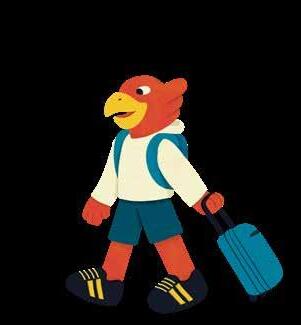
The University has committed a significant amount of money and resources to support financial aid programs for 2025-26. These programs are designed to help students in financial need with managing the cost of post-secondary education.
Undergraduate Financial Need Assessment Forms: October 7, 2025
Graduate Financial Need Assessment Forms: January 12, 2026
Work Study Financial Need Assessment Forms: January 19, 2026
Undergraduate students will be notified by late November and will have their award applied as a credit on their winter 2026 student account.
Graduate students will be notified in February 2026.

any time.
The Work Study program allows you to gain valuable experience working for U of G departments while earning money at the same time. Apply to Student Financial Services by completing a Financial Need Assessment Form as soon as possible. Notifications are sent via email within 5-10 business days.
INFORMATION and APPLICATIONS can be found at uoguelph.ca/registrar/sfs
Contact awards@uoguelph.ca for more information.

Photo: Naincy Sharma
Breed: Domestic Shorthair
Age: 7 months
Fun Fact: He is named after Meowth from Team Rocket but loves to steal kisses instead of pokémon.
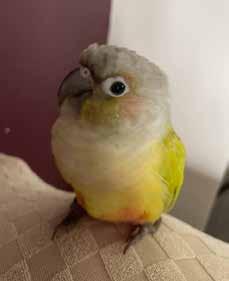
Photo: Amaza Payne
Breed: Pineapple Conure
Age: 5
Fun Fact: If you dance, he’ll dance with you!

Photo: Nicole Logiacco
Breed: Domestic Shorthair
Age: 4
Fun Fact: He runs to the back door when he hears his harness get picked up because he knows he gets to go outside!

MEET OLLIE!
Photo: Jordyn Moorehead
Breed: Domestic Shorthair
Age: 3
Fun Fact: His favourite thing to do is play fetch!










Rachel joined The Ontarion in 2020 as a volunteer journalist where she discovered her passion for writing. She’s always on the search for the next five-star read, trying a new yoga pose and playing with her bunny, Velveteen.

ARNOLD
PATRICK SUTHERLAND Editor-in-Chief Marketing Coordinator Executive Director Graphic Designer Accountant
Laurie received her CPA designation and Laurentian University HB Comm degree in 2017. She enjoys spending time with family and friends, hiking nature trails, cooking, and dining out at various restaurants.
Lucca graduated from Wilfrid Laurier University in 2024 with a degree in Communications - Digital Media and joined The Ontarion that same year. She's the friend you can count on to bring your Pinterest board to life and capture the perfect aesthetic to post. When she is not working, you'll probably find her with an Aperol Spritz in hand or wandering around Home Sense.

Paige has been designing for The Ontarion since 2022. She also works as a freelance editorial illustrator, specializing in conceptual illustration and mixed media portraits. In her spare time she enjoys prowling through thrift stores, sewing and watching horrible reality TV.
Check out our Instagram @ontarionupdates for featured posts meeting the rest of our amazing team!
A U of G grad, Patrick first got involved with The Ontarion in by volunteering for the Board of Directors where he enjoyed using his Human Resources Management education. He enjoys spending time with animals, playing board games and rock climbing.
Whether this is your 1st year or 5th year, it’s never too late to start, and to enjoy the benefits of volunteering with us. People have met their future spouse, their best friend and their favourite musicians while volunteering with The Ontarion, and you might too!
Let’s take a closer look at some of the reasons to volunteer with The Ontarion.
For starters, your resume will thank you. We teach you hands-on skills that you can put on your resume to really impress your future employers. These days most employers in most fields want to know that you can communicate effectively and work well on a team. Volunteering with us gives you the opportunity to show employers that you can handle deadlines, can write well,
and represent an organization to the public. But there are more reasons than just your resume! Here you will gain opportunities to learn new skills, meet amazing people, and get a little excitement (covering your first concert or protest can be quite a thrill). You’ll also get to see your name in print and get to show off to all your friends and family! You’d be surprised how much
Grandma loves the campus newspaper. We provide the opportunity for you to meet and interview people (sometimes famous people!), go to concerts and other events, share your passion for any topic with our readers and a whole lot more. You might also learn a thing or two in the process! So, what are you waiting for? Come see us and learn more today!
Across 1–South American monkey
5–Drain
8–Steps down to an Indian river
12–Toothbrush brand
14–Jessica of "Dark Angel"
15–___ bene
16–Kitchen gadget
17–Insect-repelling chemical
18–Bartlett's abbr.
19–Dauntless
21–Almost never
23–German "a"
24–Mazel ___
25–In the style of
26–Small spots
30–Large cat
32–A long time
33–Worthy of reverence
37–Blue hue
38–Nautical temptress of Greek mythology
39–Scottish refusals
40–Waterclock
42–Gillette razors
43–We're Off ___ the Wizard
44–Preserve, as fodder
45–Contingencies
48–Skater Midori
49–The Monkees' "___ Believer"
50–Conflict
52–Capable of being taught
57–Chapter of the Quran
58–Fr. miss
60–Out of favour
61–Genesis grandson
62–___ Camera (1951 play)
63–Singer Furtado
64–Sleeps briefly
65–Dove sound
66–General ___ chicken
Down
1–Species of antelope found in
South Africa
2–Persian land
3–Sharp to the taste
4–Robert of "The Sopranos"
5–Dog-powered snow vehicle
6–Playwright Burrows
7–Disease-producing agent
8–Growl
9–Accord maker
10–Ring-shaped island
11–Country singer Tucker
13–Scottish trousers
14–Point after deuce
20–Greek letters
22–Say for sure
24–Fungal infection of the skin or nails
26–Lip-___
27–Ring the bells
28–Mansard overhang
29–Subterranean vault
30–___ Haute
31–Carries on
33–Home movie medium
34–Adriatic port
35–Loyal or faithful
36–To be, to Brutus
38–Affecting the whole body
41–Stain
42–Bayer alternative
44–Big bird
45–"A Doll's House" playwright
46–Animal life
47–Razor sharpener
49–It's a thought
51–Russian news service
52–Patron saint of sailors
53–Work without ___
54–OPEC units
55–"Le Roi d'Ys" composer
56–Ice cream brand
59–Vientiane native
For your chance to win two Bobs dog’s and two pops, just complete the crossword, snap a picture, and send it to puzzles@theontarion.com by Sept 18 at 3 p.m. Winners are announced in each issue and can arrange a pickup of their voucher by emailing the same address.
Last issue’s winning puzzle was submitted by Kate Morrice!
The Ontarion Inc.
University Centre Room 264 University of Guelph N1G 2W1 ontarion@uoguelph.ca
519-824-4120
Editorial: x 58250
Advertising: x 58267
Accounts: x 53534
EDITORIAL STAFF
Editor-in-Chief
Rachel Fioret
Associate Editor
Emmerson Jull
News Editor
Abby Counahan
Arts & Culture Editor
Andreea Burlacu
Copy Editor & Fact Checker
Olivia Strutt
Digital Editor
Alyssa Cunningham
PRODUCTION STAFF
Graphic Designer/Art Director
Paige Stampatori
OFFICE STAFF
Executive Director
Patrick Sutherland
Accountant
Laurie Arnold
Marketing Coordinator
Lucca Maggiolo
BOARD OF DIRECTORS
Chair
Katelynn Huong
Vice Chair
Paula Henry-Duru
Treasurer
Denver Bubelich
Secretary
OPEN POSITION
DIRECTORS
Mariana Erazo
Oliver Bullingham
Simran Aujla
Maia Galletta
CONTRIBUTORS
REMA ABDULLAH
LAURA APBLETT
ELYSE ARMSTRONG
FATIMA ASKARY
AMIR BENKELAI
SARAH D’AVILA ALEMAN
SANA GURUNATHAN
PAULA HENRY-DURU
ADITYA PARAMESWARAN
EMILY SCOTT
KYLE SALTER
NAINCY SHARMA
ASHLYN STUART
Fill in the empty squares so that each of the digits 1 through 9 appear once in each row, column, and 3-by-3 block.


The Ontarion is a non-profit organization governed by a Board of Directors. Since The Ontarion undertakes the publishing of student work, the opinions expressed in this publication do not necessarily reflect those of The Ontarion staff and Board of Directors. The Ontarion reserves the right to edit or refuse all material deemed sexist, racist, homophobic, or otherwise unfit for publication as determined by the Editor-in-Chief. Material of any form appearing in this newspaper is copyrighted 2025 and cannot be reprinted without the approval of the Editor-in-Chief. The Ontarion retains the right of first publication on all material. In the event that an advertiser is not satisfied with an advertisement in the newspaper, they must notify The Ontarion within four working days of publication. The Ontarion will not be held responsible for advertising mistakes beyond the cost of advertisement. The Ontarion is printed by Master Web, Inc.







































